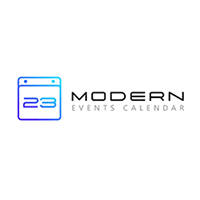- The People Behind Modern Events Calendar
- What Does Modern Events Calendar Offer?
- The Free Version of Modern Events Calendar
- The Settings Area of Modern Events Calendar
- Importing Events From Other WordPress Event Calendar Plugins
- Getting help Where You Need It
- Modern Events Calendar Pro
- Modern Events Calendar Addons
- The Cost of Using Modern Events Calendar
- Final Thoughts
Modern Events Calendar is an advanced events calendar solution for WordPress that simplifies the task of managing events, publicising events, and taking bookings.
A lite version of the WordPress plugin has over 20,000 installations and counting. This is no surprise given how much functionality is included with it.
Whilst it is easy to recommend the free version of Modern Events Calendar, the developers have given website owners many reasons to upgrade to the pro version, such as a feature-rich booking system that works with many payment gateways.
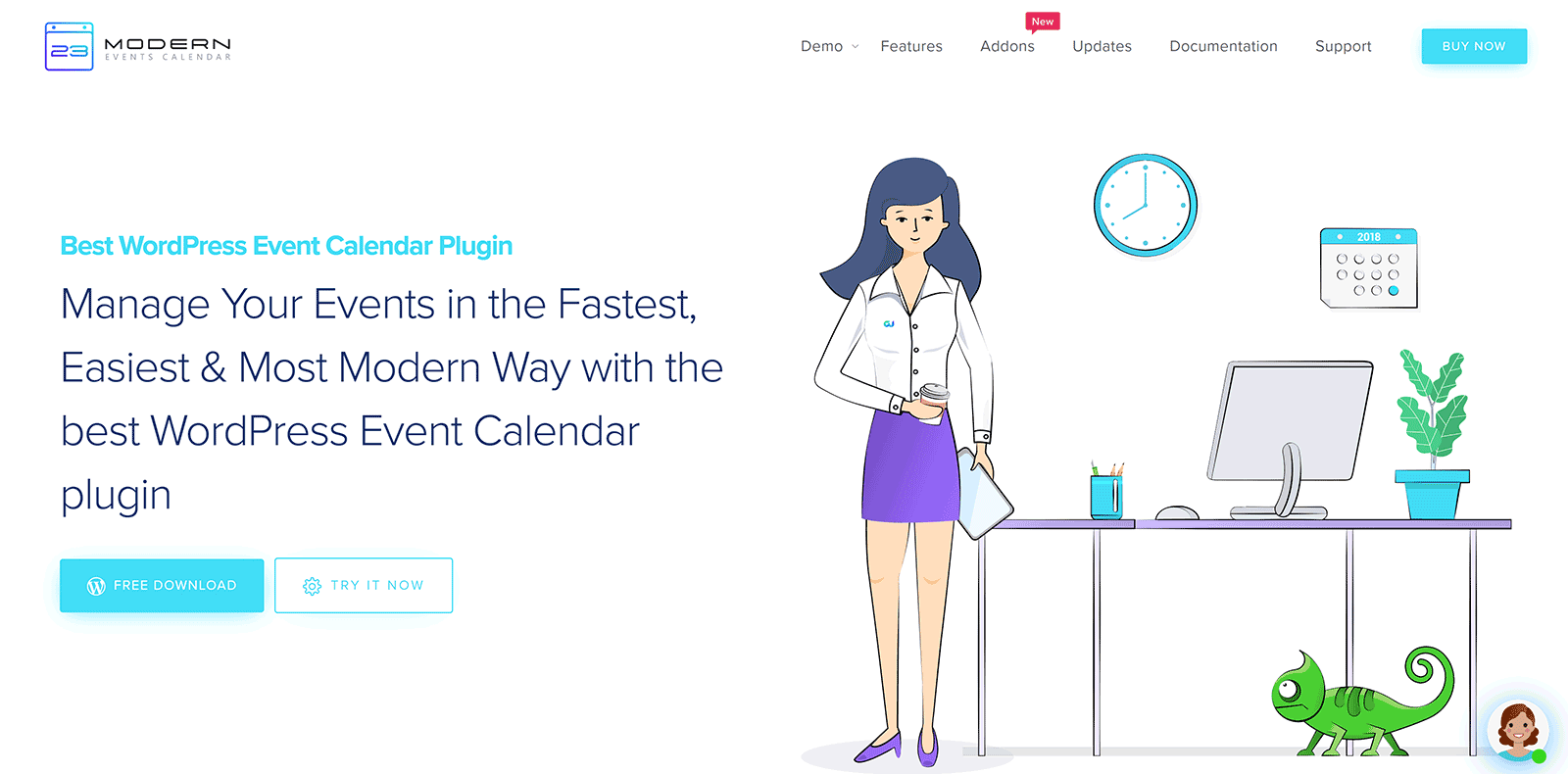
In this review, I would like to take a close look at Modern Events Calendar and show you the lite version and the pro version. I will also show you what premium addons are available.
Please be aware, however, that Modern Events Calendar is a big WordPress plugin. This review is over four and a half thousand words long, but I have still only scratched the surface on the settings and customisation options that are available within the plugin.
I hope you enjoy the review :)
The People Behind Modern Events Calendar
Modern Events Calendar was developed by Webnus.
The company launched in 2013. Initially, they sold HTML templates, but they soon started releasing their first WordPress themes.
Today, Webnus offer a total of twenty-two WordPress themes. There is a good variety of themes on offer such as the church design Vision, the education design Michigan Learning Suite, and the wedding design Wedding Suite.
The one that stands out for me is their Deep WordPress theme. It comes with dozens of unique theme skins and can be modified using many different drag and drop page builders. It has fantastic support for WooCommerce too and has an advanced settings area for customising everything.
A free version of Deep is available, however you can get access to all twenty-two Webnus themes from only $49. This gives you one year of updates and lifetime updates for all themes.

The company are also behind the comment WordPress plugin Deeper Comments and the Power VC Add-on For WPBakery Page Builder. You can download Deeper Comments and Power VC from WordPress.org free of charge.
Deeper Comments can drastically improve your comment area by improving the design, allowing commenters to login via Google, display nested comments, and more.
Power VC adds many new features to the drag and drop page builder WPBakery Page Builder. It will add additional content modules, new templates, new sections, and the ability to cut and paste content across pages.
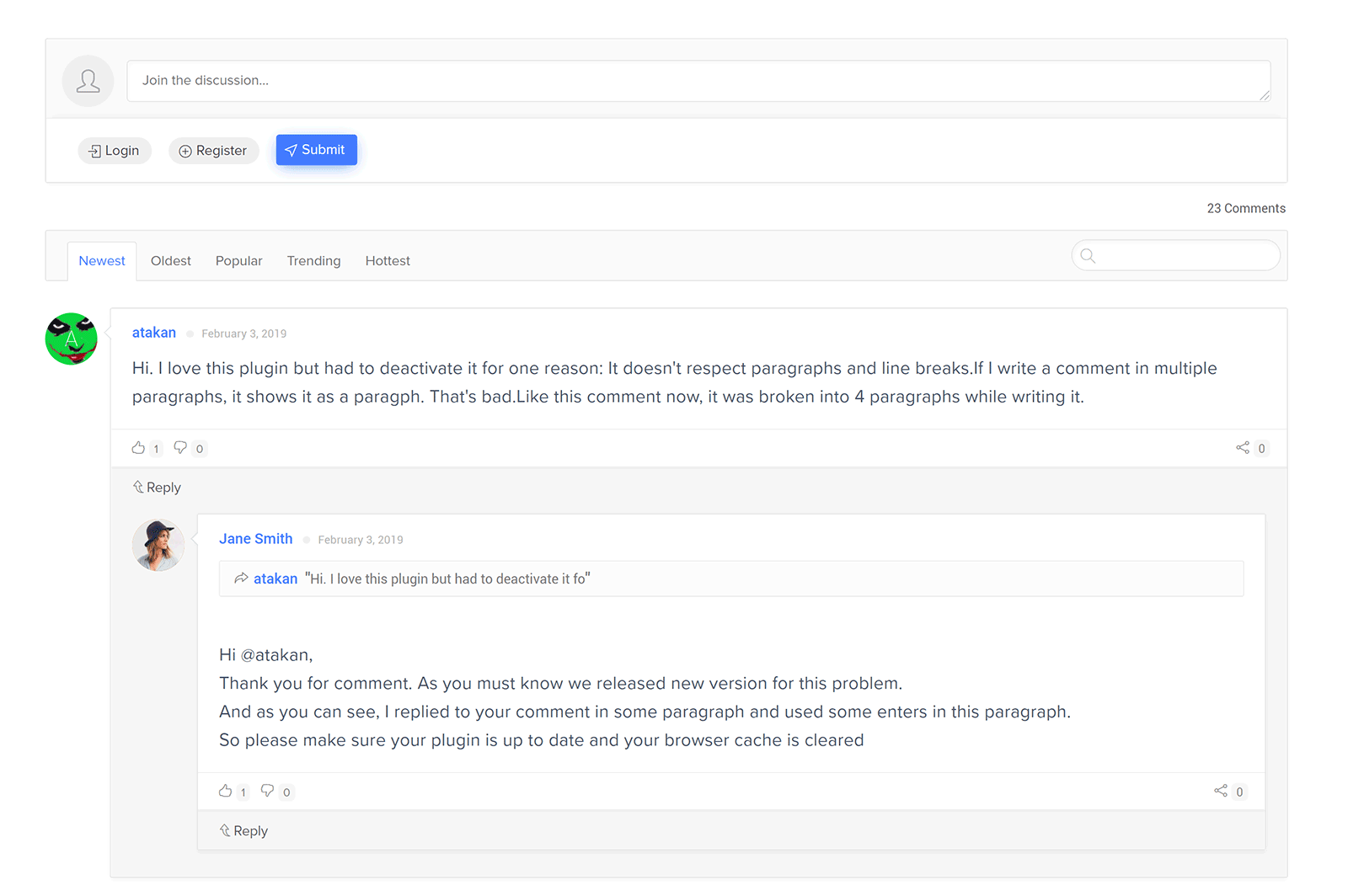
One thing I like about Webnus is that all of their products come with lifetime updates.
With most companies, when your year of support ends, you also stop receiving updates for the product. Webnus handle it differently. Whilst support expires after one year, you can continue to receive updates for the life of the product.
I wish more companies sold WordPress products in that way as there is less need for support in the later years.
What Does Modern Events Calendar Offer?
Modern Events Calendar can be used to manage every aspect of your events.
Events can be created from scratch, imported from services such as Google Calendar, or imported from other WordPress event plugins. You can also use a form on your website to accept event submissions from users.
You can promote upcoming events in dozens of different ways such as calendars, grids, lists, sliders, countdowns, timetables, and more.
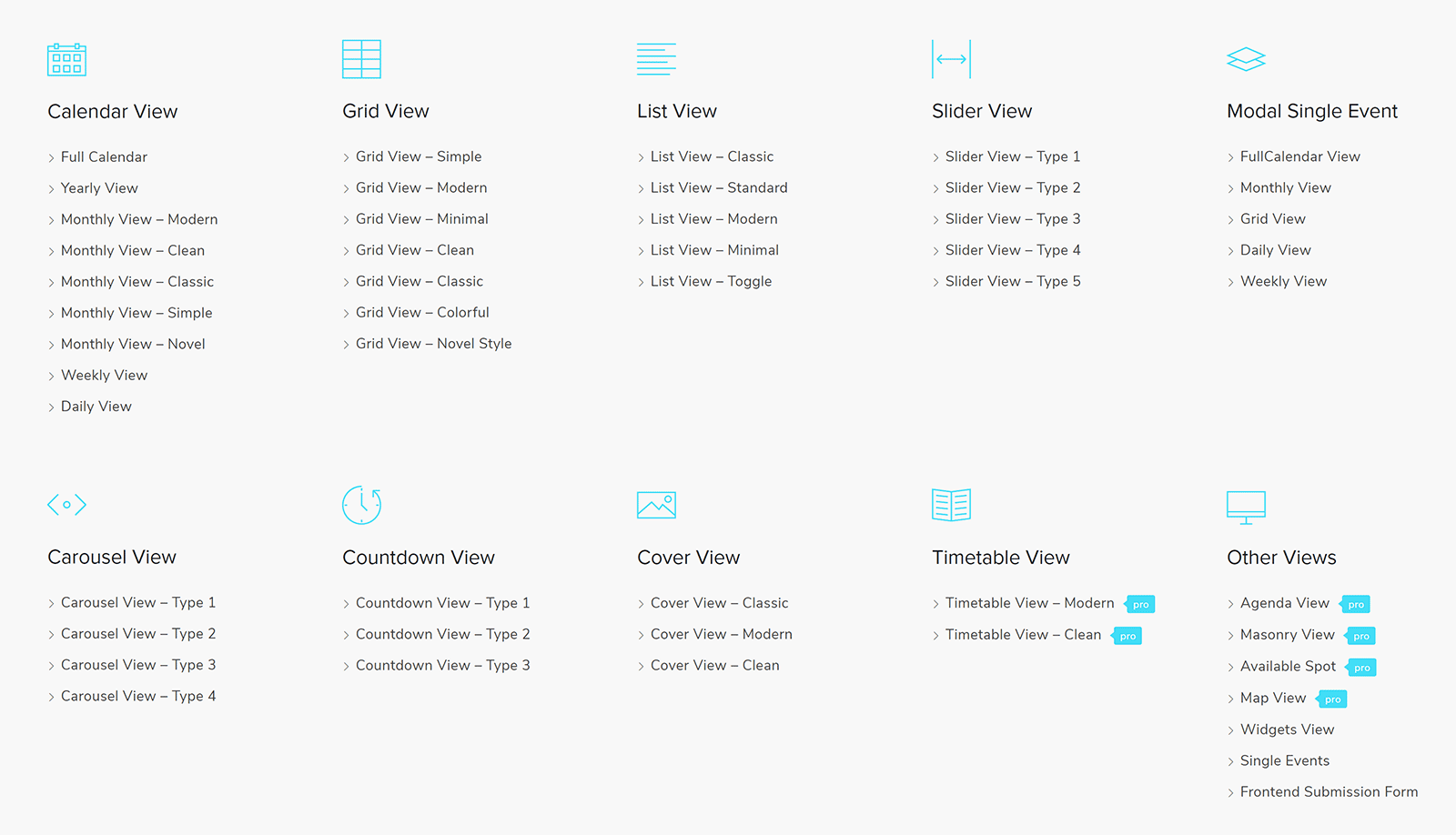
The level of customisation in Modern Events Calendar is amazing.
In the backend you can create unique forms for events and define exactly what information is displayed such as the event status, location, date, start time, cost, speakers, and more.
If you upgrade to Modern Events Calendar Pro, you can also accept bookings directly through your website using popular payment services.
The plugin works well with other WordPress plugins too.
Let’s take a closer look at Modern Events Calendar. This will give you a better appreciation of just how powerful the WordPress plugin is.
The Free Version of Modern Events Calendar
The free version of Modern Events Calendar can be downloaded from WordPress.org or from the plugin page of your WordPress admin area.
The plugin works with the new WordPress editor, however it also works perfectly if you have the classic editor installed.
Once you have activated Modern Events Calendar, you will be taken to a welcome page. This page reminds you that you are using the lite version, talks about available premium addons, and displays a YouTube video that explains how you can get started.
A summary of your events is displayed too. In addition to a list of your events being shown, it shows the number of events, shortcodes, locations, and organisers, currently on your website.
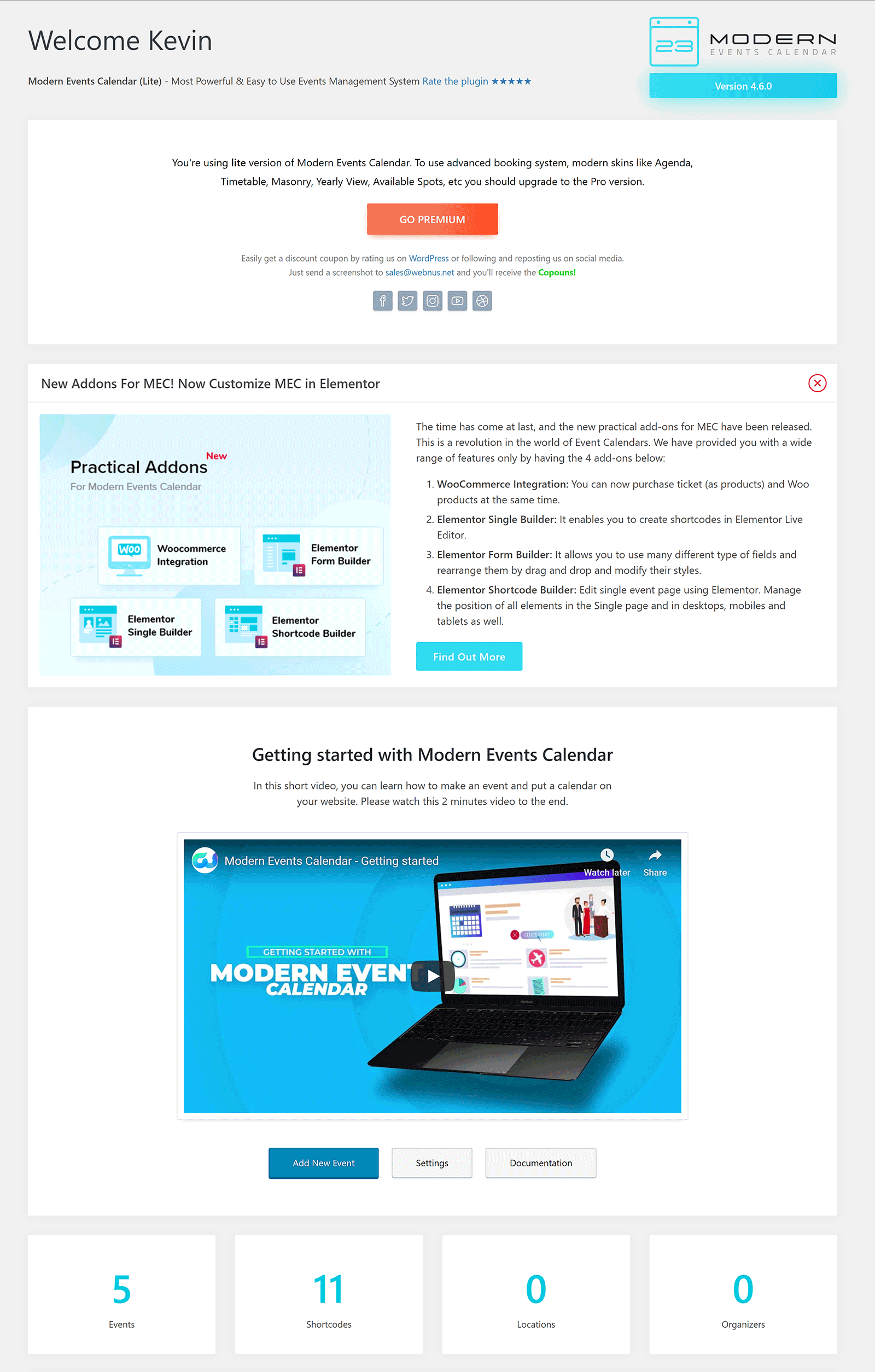
A total of 13 pages are listed in the Modern Events Calendar admin menu.
The plugin positions the menu between the comments and appearance admin links. Of course, depending on which other WordPress plugins you have installed on your website, it may be lower down in the menu.
I highly recommend using the amazing Admin Menu Editor WordPress plugin if you want to organise your admin menu and moving links for plugins such as Modern Events Calendar around.
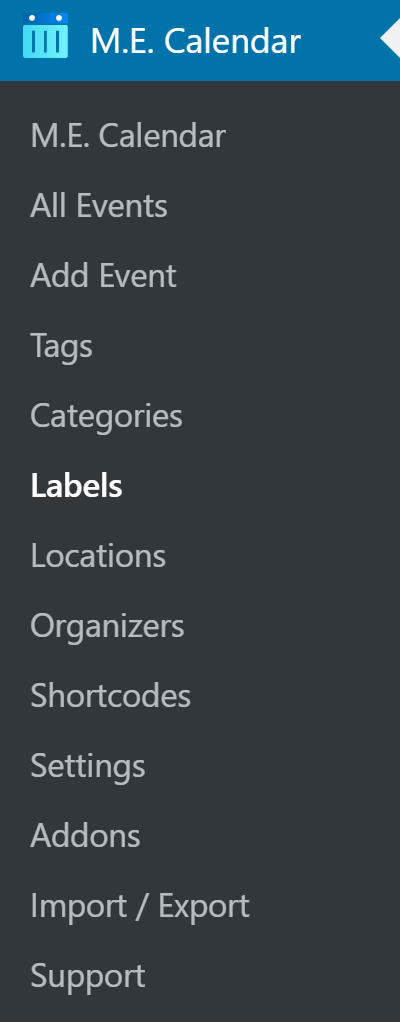
With 13 pages being listed, the admin menu can be a little overwhelming at first. I do think the developers could make the menu a little more concise and group some pages together.
For example, WordPress taxonomies such as tags, categories, labels, locations, and organisers, all have a presence in the main menu. Whilst this does make it quicker to reach these pages, I think that it would be better to place all taxonomies under one admin link so that the menu is shorter.
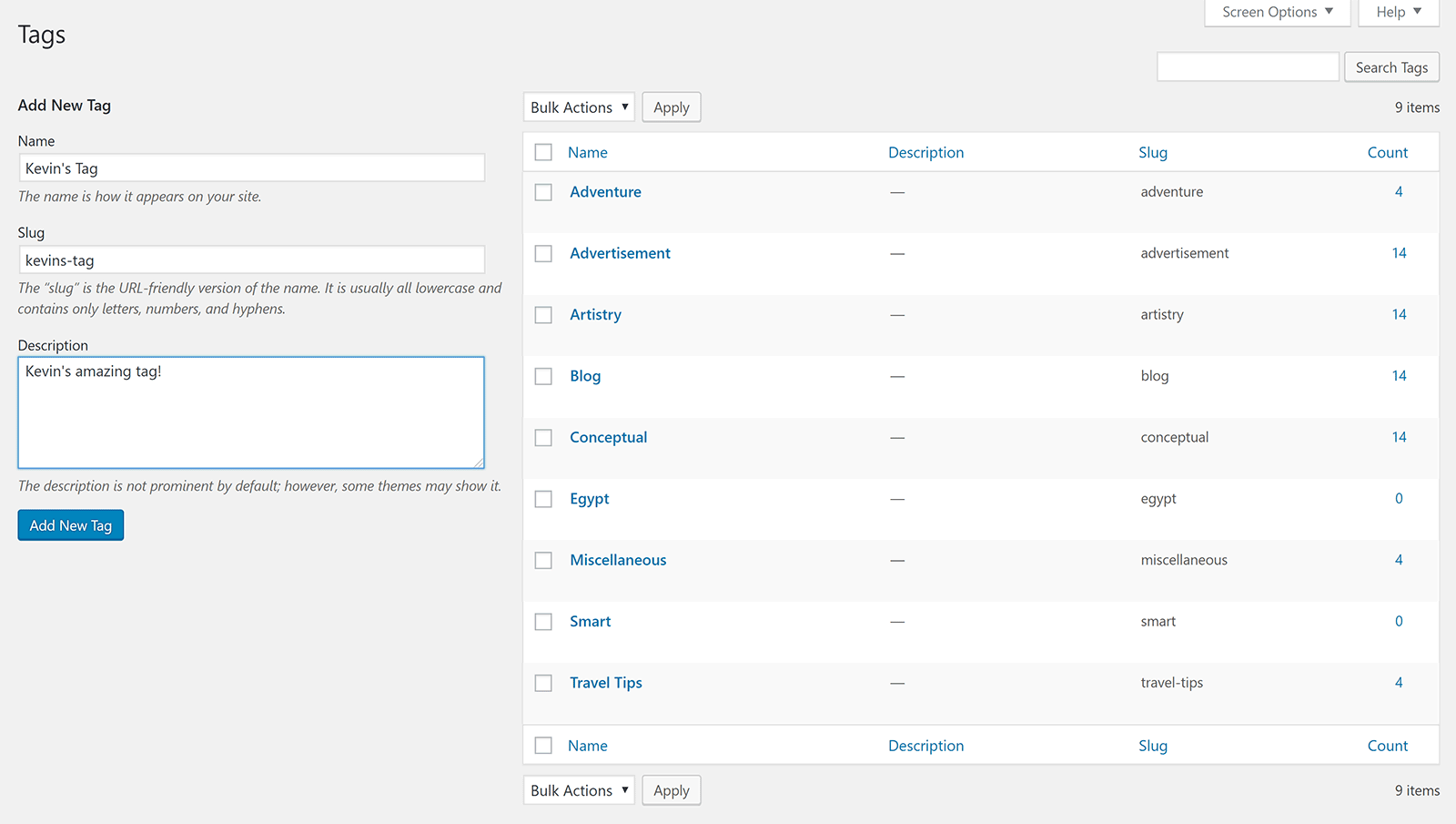
All events are listed in the main events page. A link to create new events is displayed on this page too.
Modern Events Calendar provides five example events for you to help you see what types of events can be created and how their plugin works. It is little things like this that helps new users when they first start using a plugin.
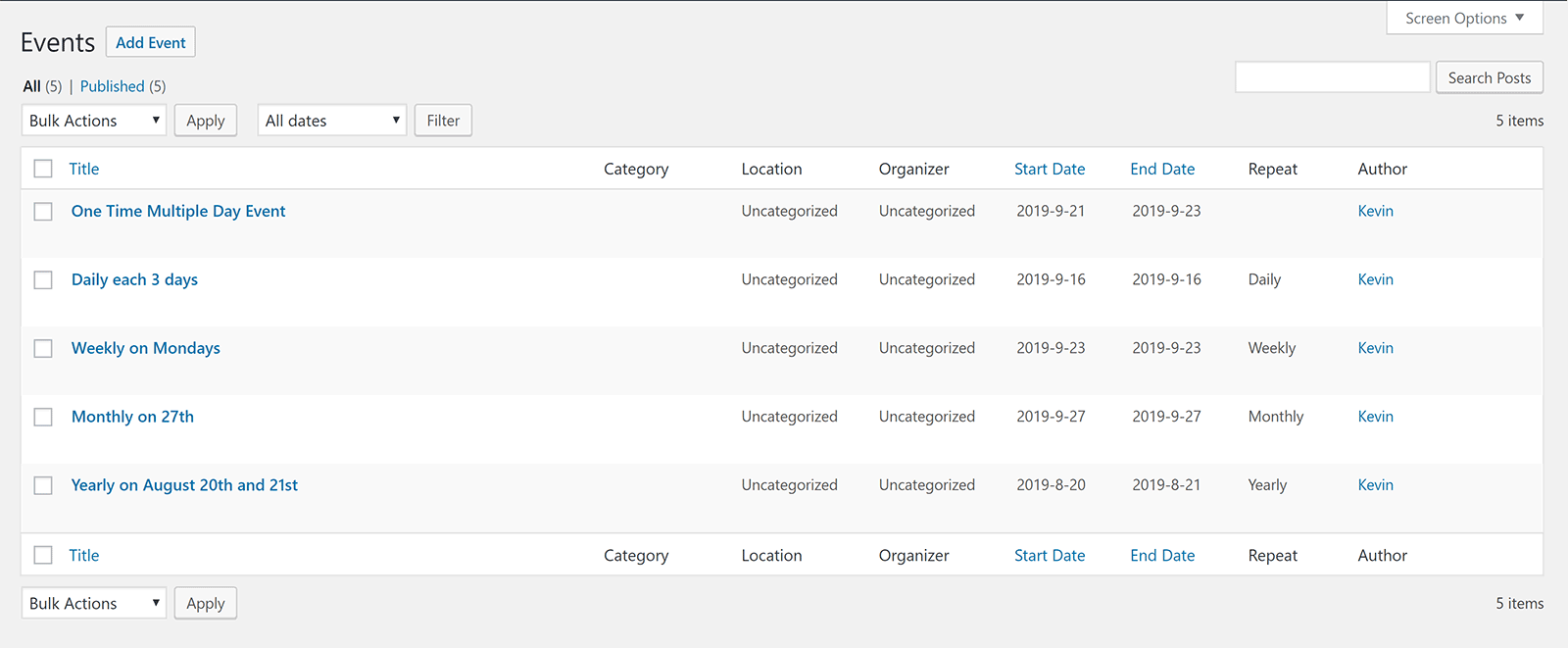
Each event can be tailored to suit the event. At the top of the page you can name your event and then add a detailed description. Since the WordPress editor is used for this, you can use text, images, videos, and more. Down the right-hand side of the page you can assign tags, categories, and labels.
The actual event is set up in the “Event Details” box.
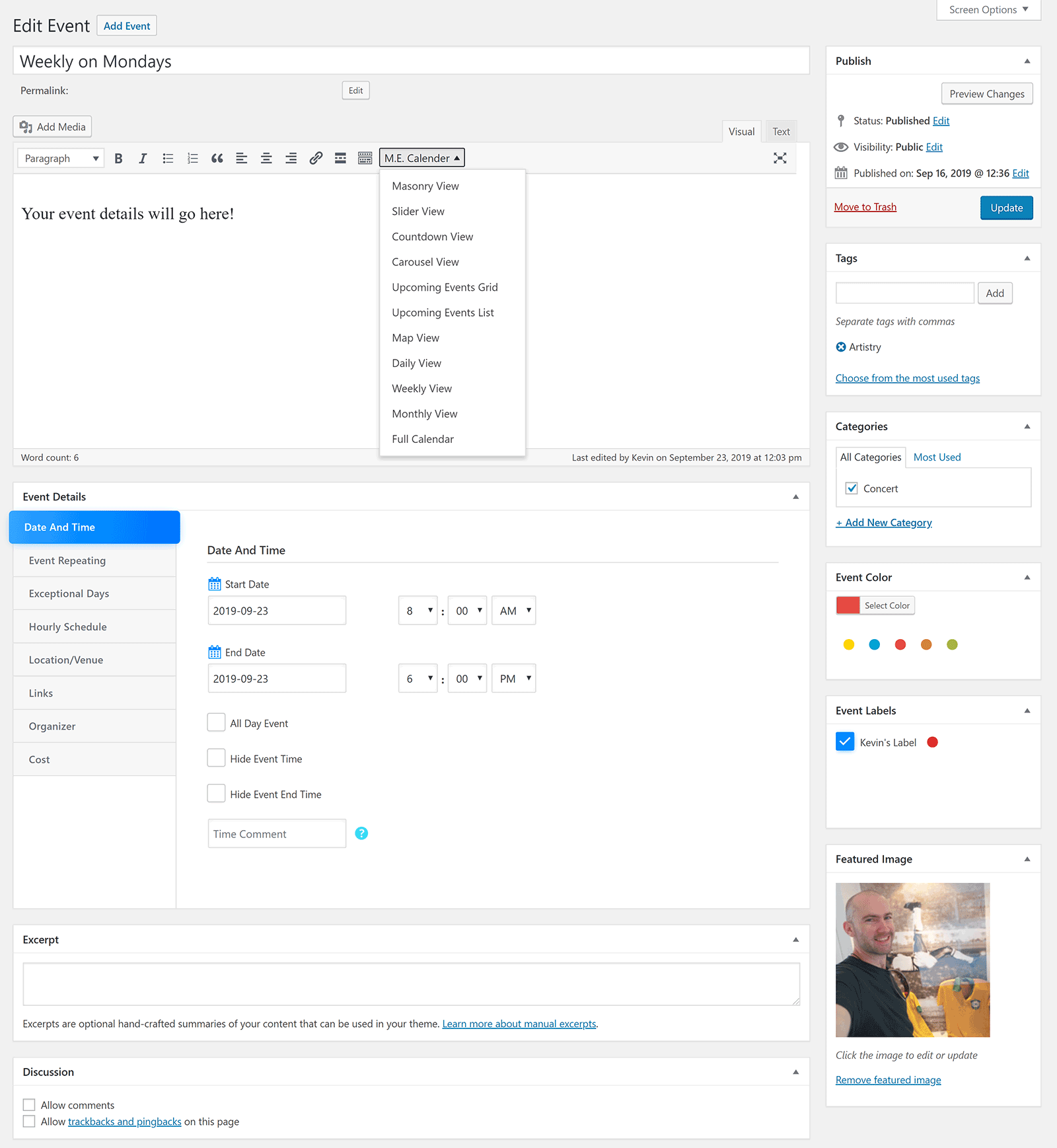
The event details box has eight tabs: Date and time, event repeating, exceptional days, hourly schedule, location and venue, links, organiser, and cost.
The options for setting up repeating events and hourly schedules are particularly impressive. A dedicated event link, and more info link, can also be defined.
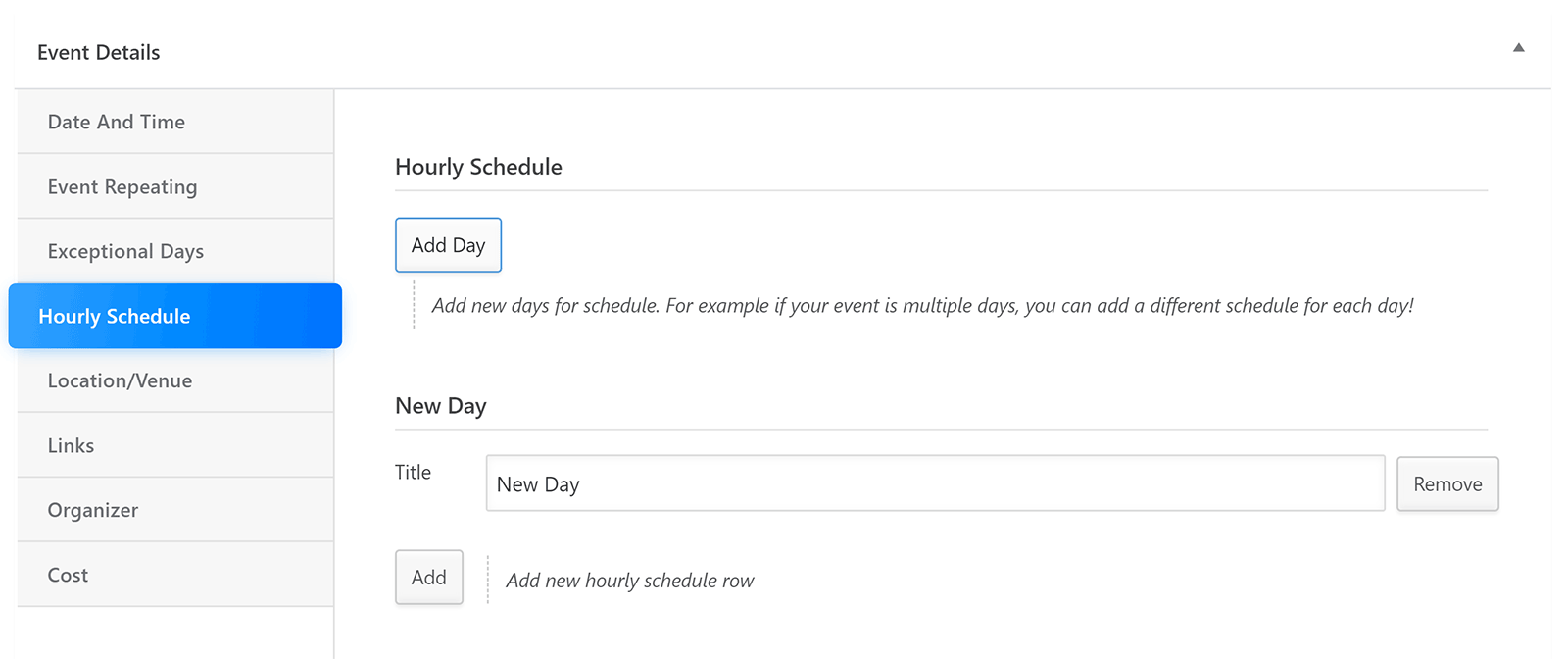
You will have noticed that in my screenshot showing an event being edited, the classic editor is being used to edit an event, not the new editor (also known as Gutenberg). You can use the new editor, however it has to be enabled from the plugin settings area.
I will speak more about the Modern Events Calendar settings area later in this article, but at this point I just want to point out that if you want to use the new editor, you need to enable it by going to the settings page from the Modern Events Calendar admin menu. Once there, go to the Single Event section and then Single Event Page and uncheck “Disable Block Editor (Gutenberg)”.
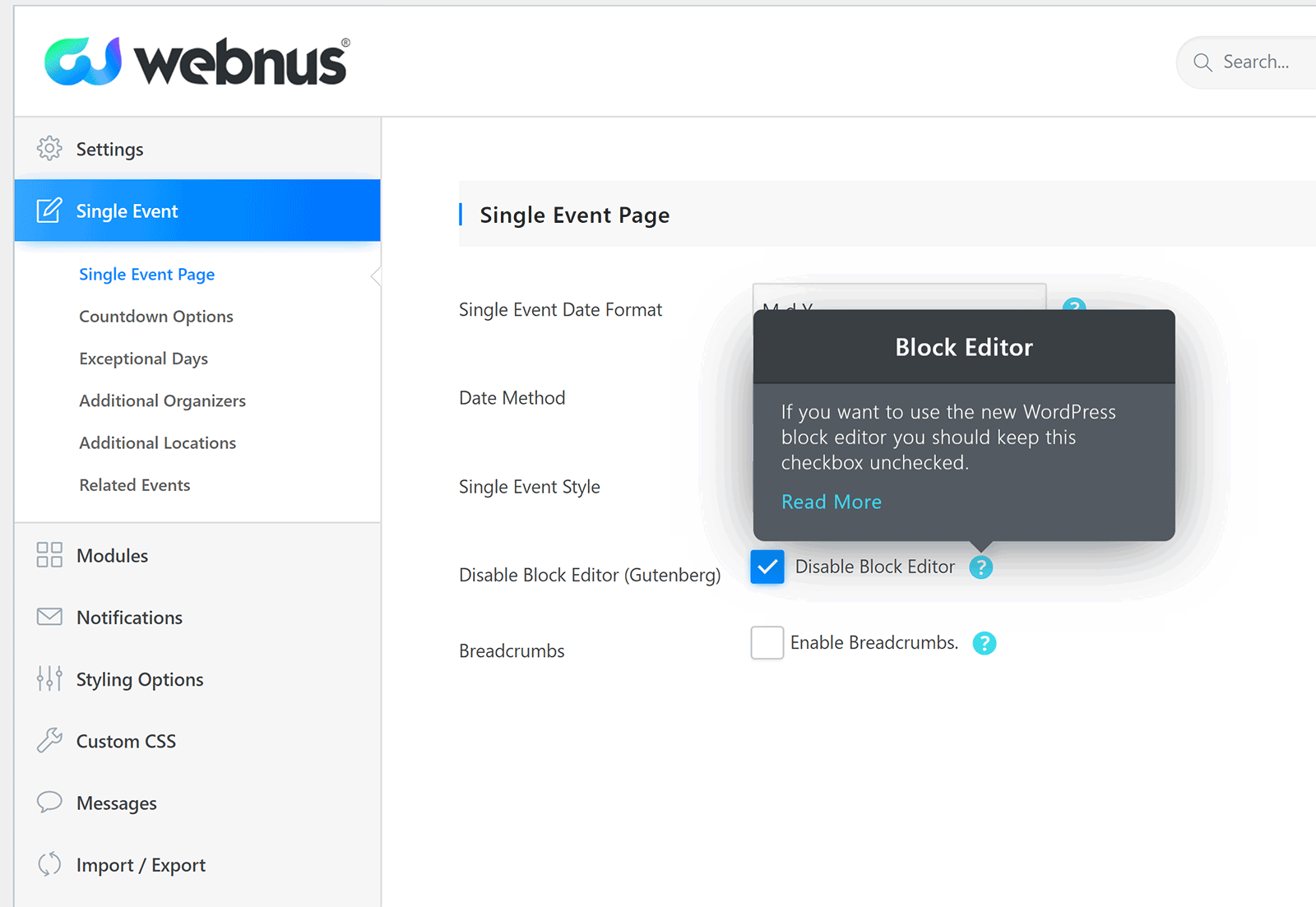
The new editor will help you create rich content in the description area. WordPress provides content modules for tables, headers, images, videos, and more, however there are thousands of additional modules available from third-party developers.
The process of modifying your event via the “Event Details” box remains the same.
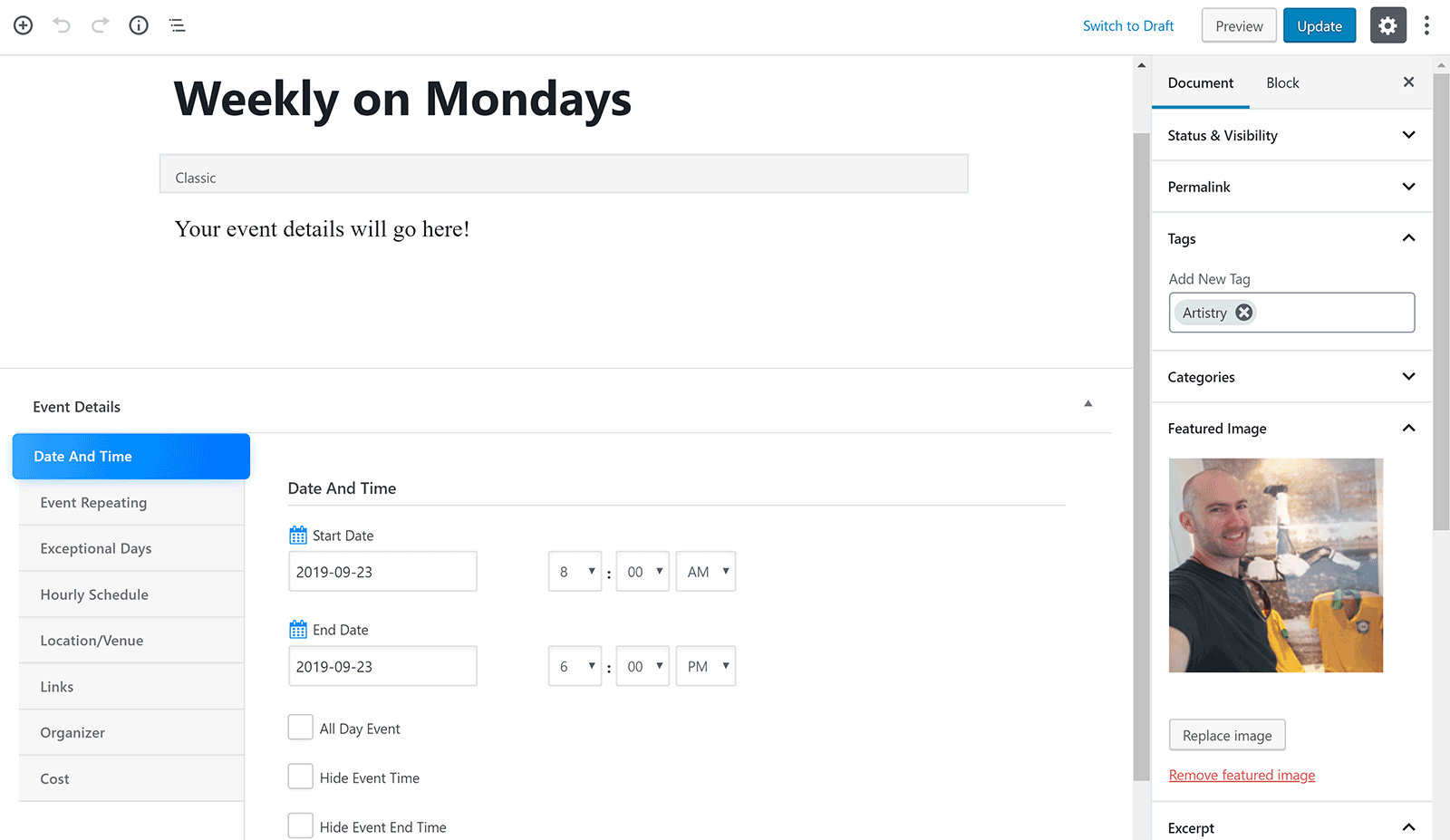
Eleven shortcodes are providing for displaying events in various views. You can also create your own custom shortcodes for displaying events.
You can display events in a list, in a map, in a carousel, a calendar, and more.
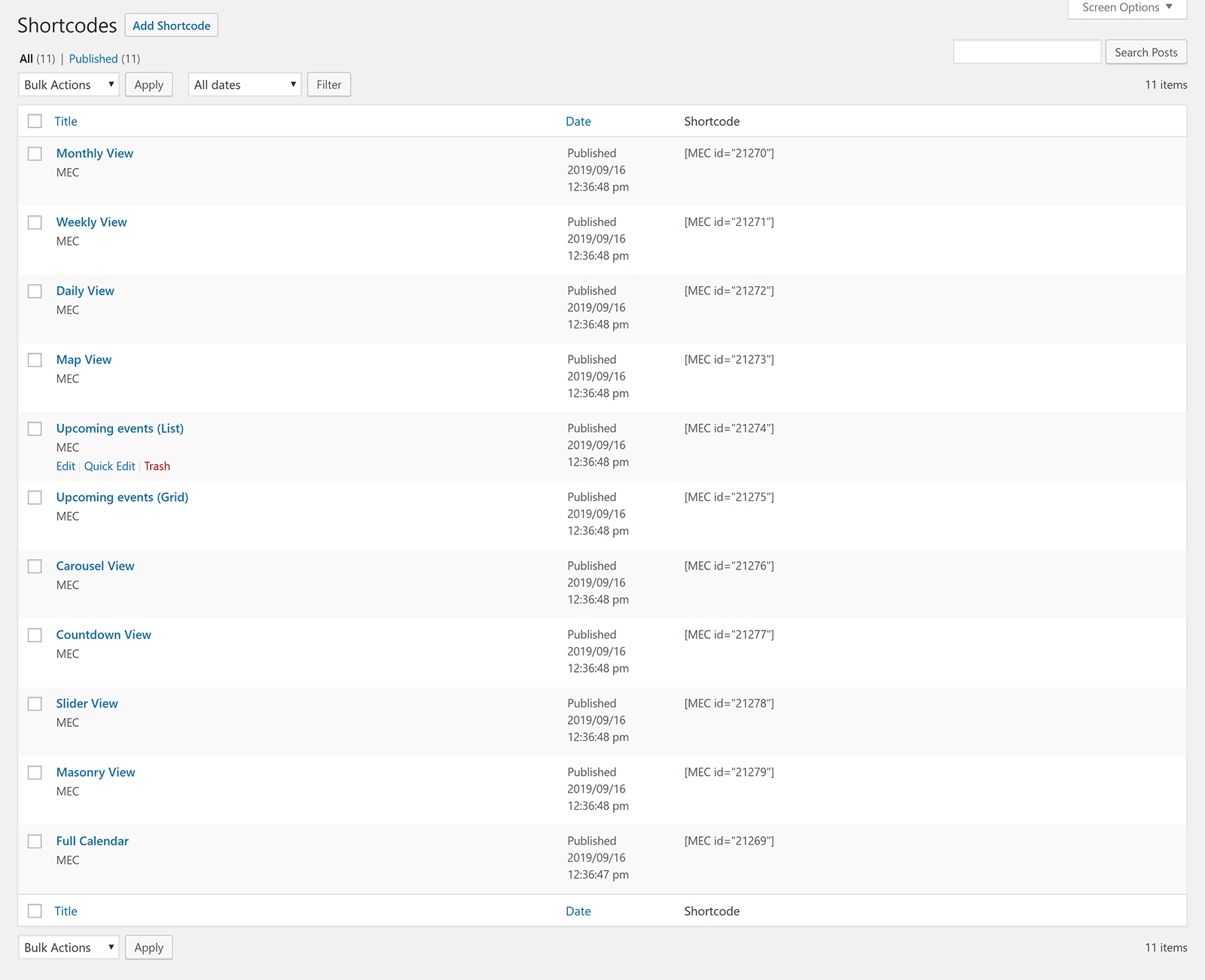
In the edit shortcode page you can select the type of view you want to use as a skin. For example, countdown view or slider view. Five styles are available: Classic, clean, modern, novel, and simple. You can also state how many events per day are displayed.
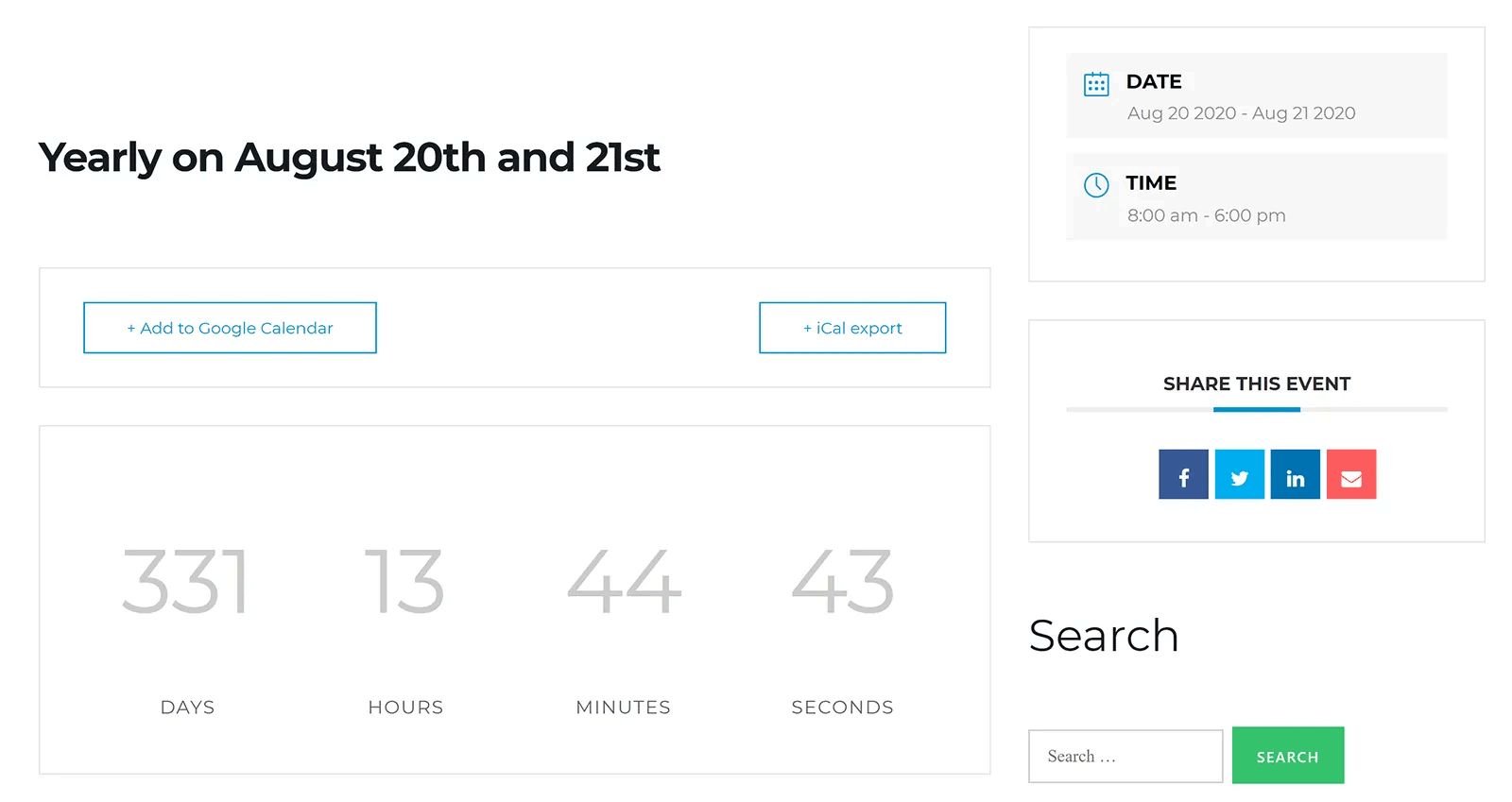
If you desire, you can allow users to filter results by categories, labels, tags, and more. This is extremely useful if you have a lot of events in your schedule.
The corresponding shortcode is displayed at the right-hand side of the page. Underneath is a widget for your search form where you can specifiy what is displayed on the form and what is not.
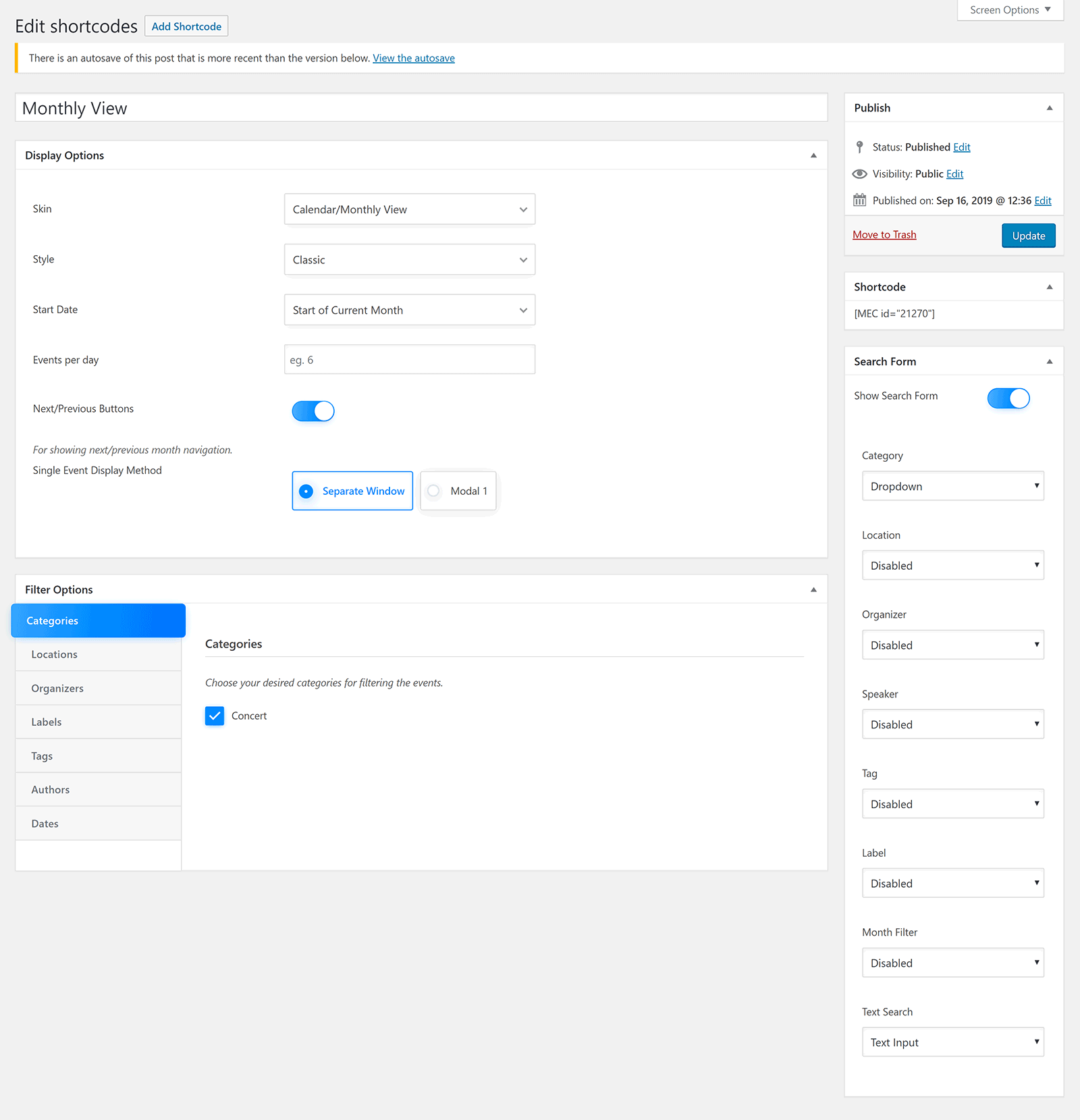
All shortcode views can be inserted into your posts and pages easily.
If the classic editor is being used, you can use the Modern Events Calendar drop down menu in your editor to select a view and insert the shortcode into your content.
All views are selectable within the new editor too. You just need to drag and drop the event view type you want into your content area. There aren’t any additional options using this method though. All the Modern Events Calendar blocks do is insert the corresponding shortcode.
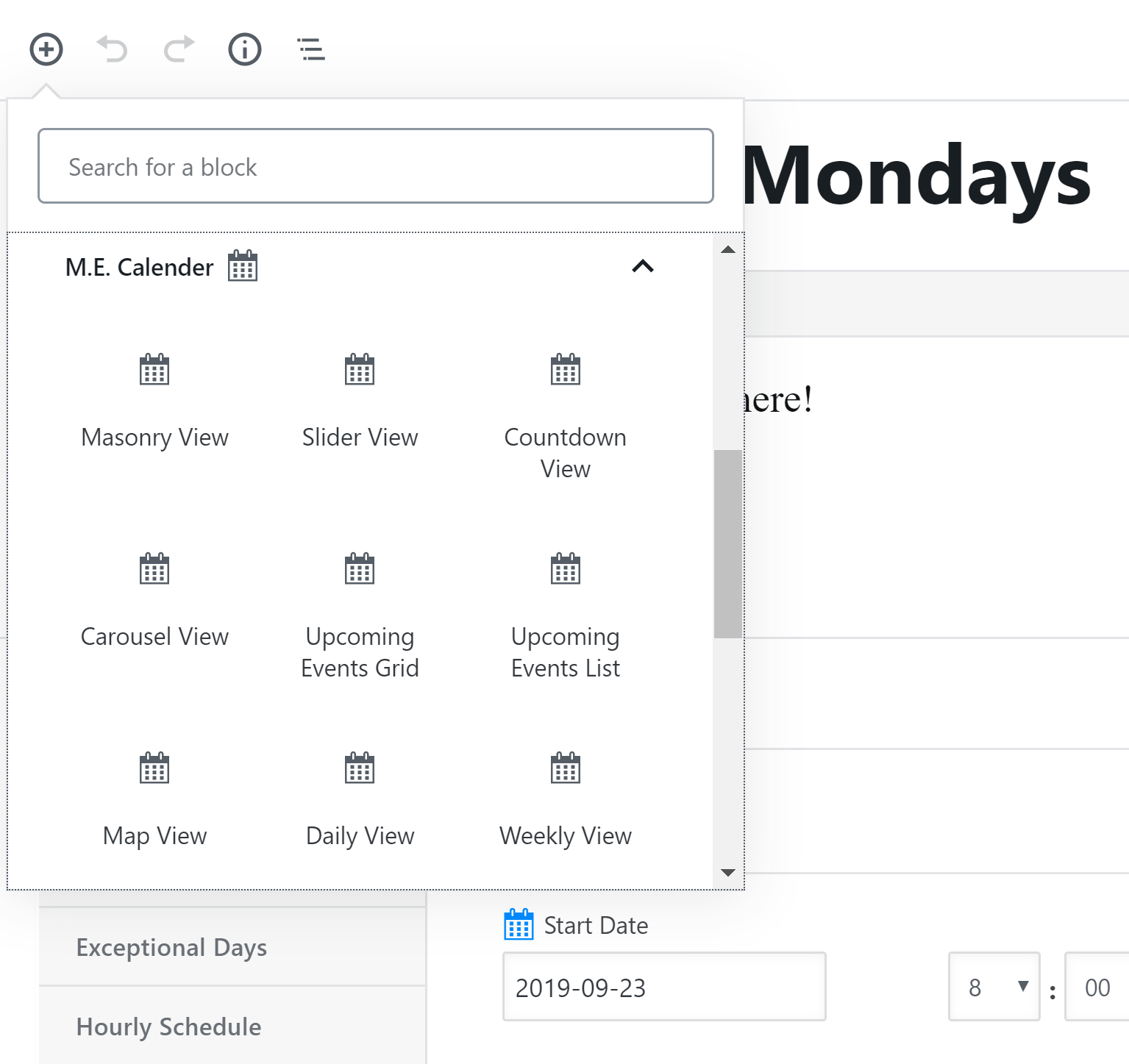
I found the whole process of creating and managing events to be straight-forward. The five pre-made events certainly help you get going and since they can be duplicated, they are great starting points for creating your own custom events.
The Settings Area of Modern Events Calendar
Modern Events Calendar has many useful options in its settings area.
In the main settings section you can define your default currency, configure Google Recaptcha to help prevent spam, and configure frontend event submissions.
One feature that stands out for me here is the ability to remove all plugin data when it is deactivated. This is a feature I have long called for to be made mandatory. It is good to see it included as so many WordPress plugins leave data in your database even after you have deleted them.
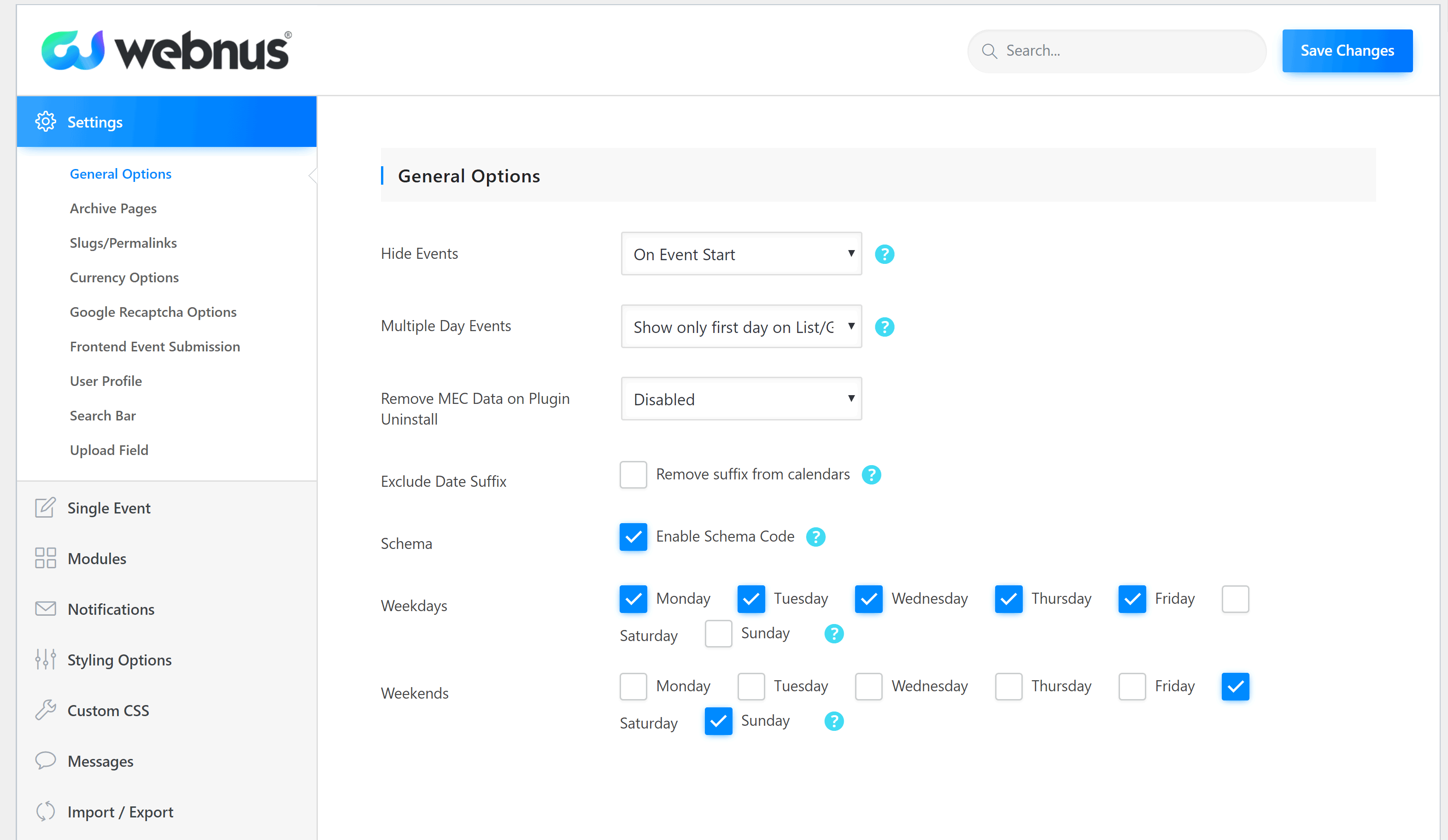
One thing that does annoy me about the settings area is that there is an unnecessarily high amount of pages. Take the single event section, for example. It has been divided into six tabs/pages, yet five of them only display one field. All of these options should really be grouped together.

Certain features have been grouped tgether and labelled as modules. You can disable and enable modules to suit your needs.
Again, I feel that all of these options could have been placed on one together instead of being spread across multiple pages.
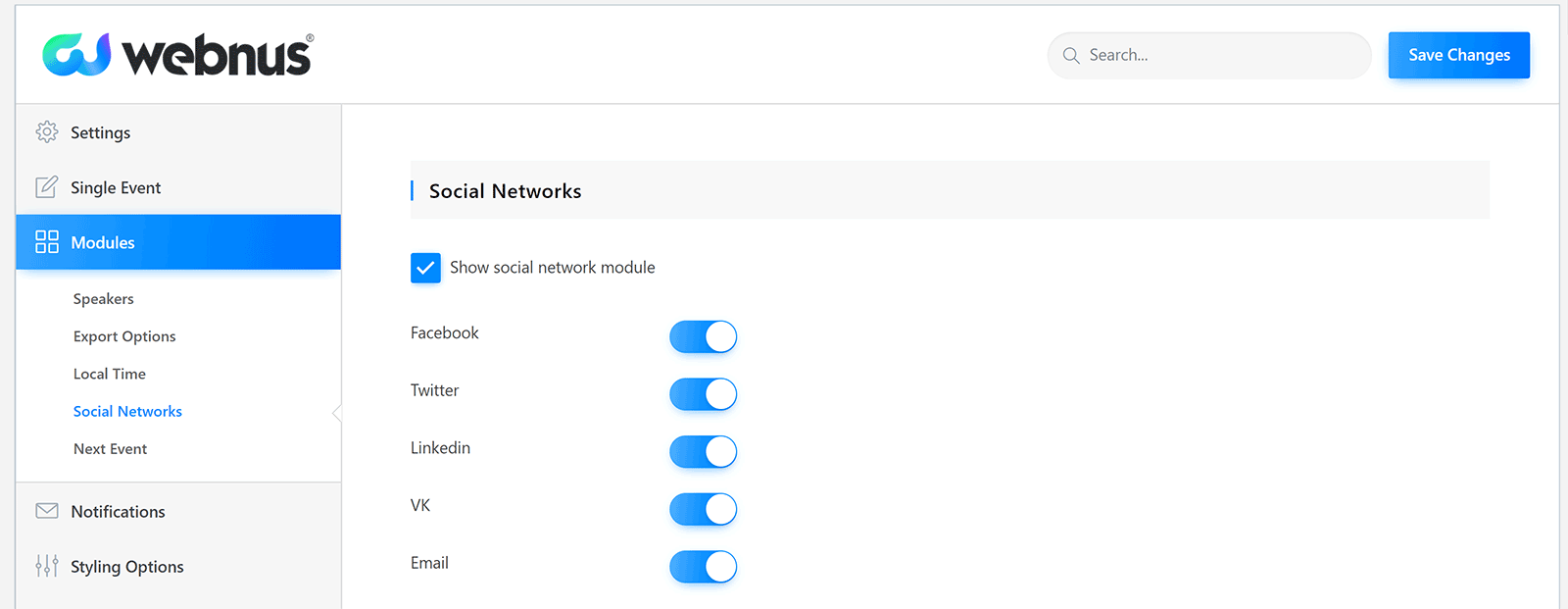
Most notification settings are restricted to Modern Events Calendar Pro users, however lite users can customise the email that is sent once a new event has been created. You can enter the emails of those you want to be notified.
You are unfortunately restricted to using your server’s email system. Hopefully we will see support for third-party email delivery services in the future.
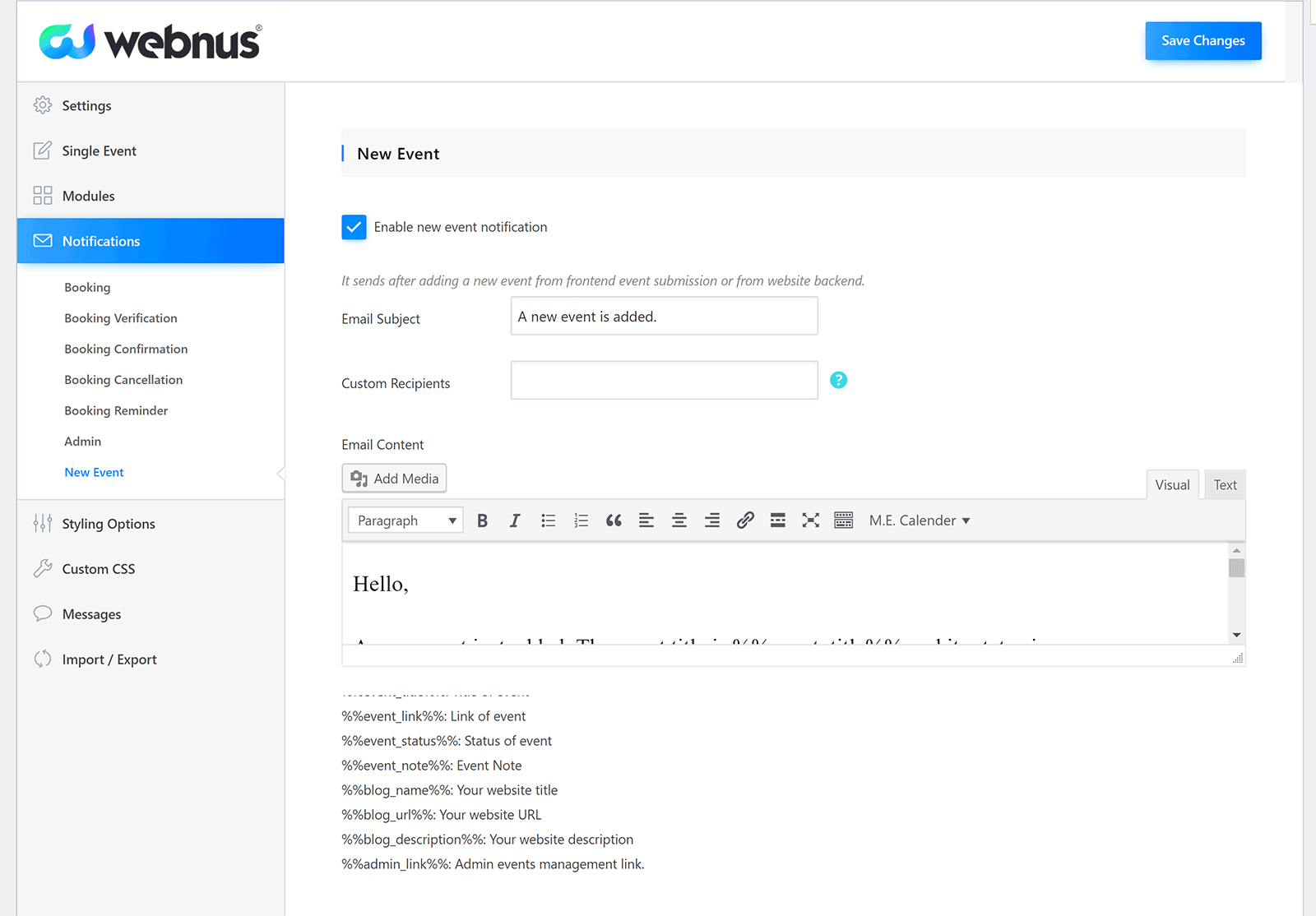
Twenty-two predefined colour skins are included, though you can use your own colours if you prefer. You can adjust the font colour of your title and content and select which Google fonts are used.
Container widths for desktops can also be defined, whilst CSS code can be entered on a separate page.
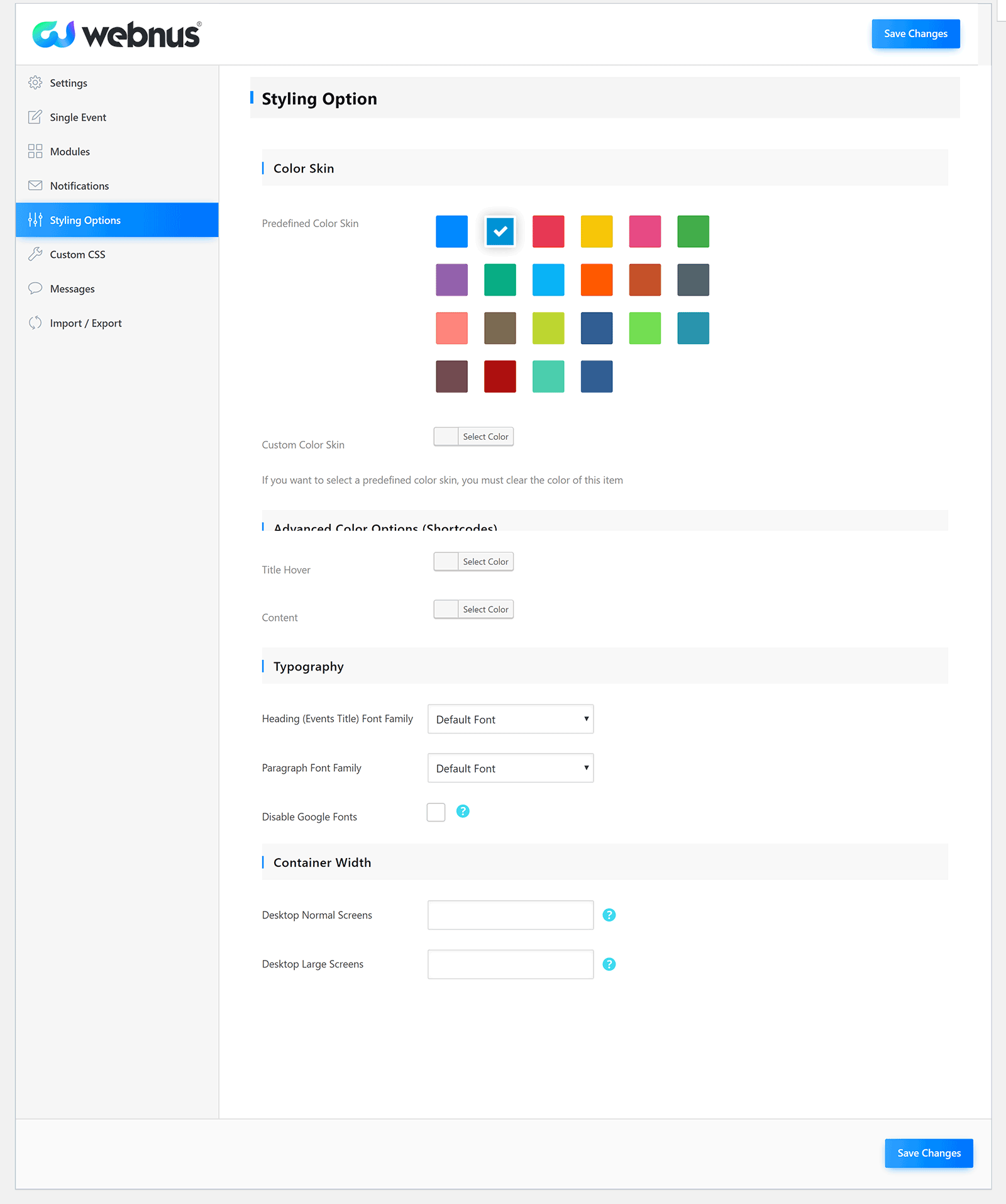
International users will be pleased to know that they can change the name of taxonomies, weekdays, and other names and terms.
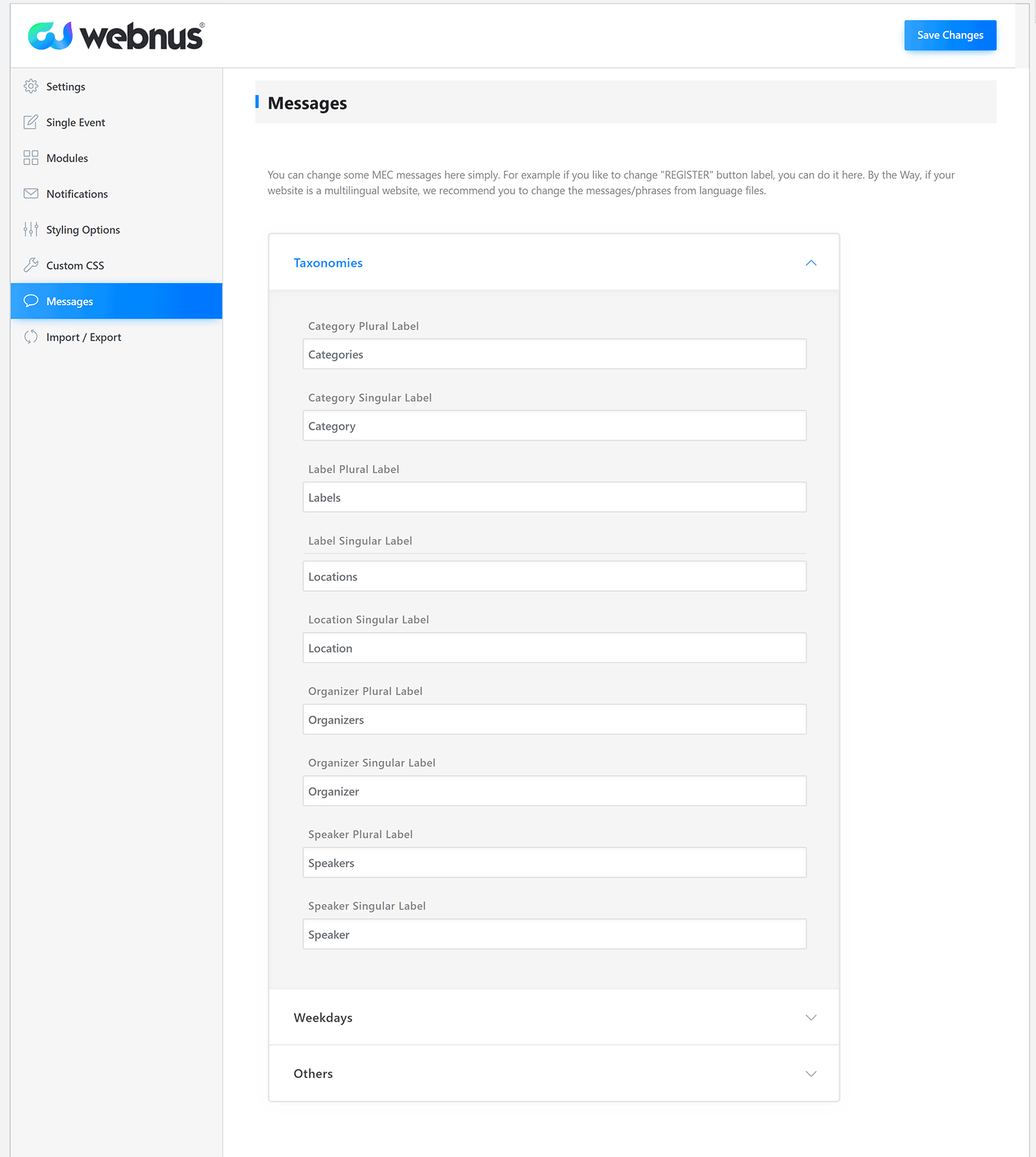
All settings can be backed up in json format. This is useful if you have modified many plugin settings.
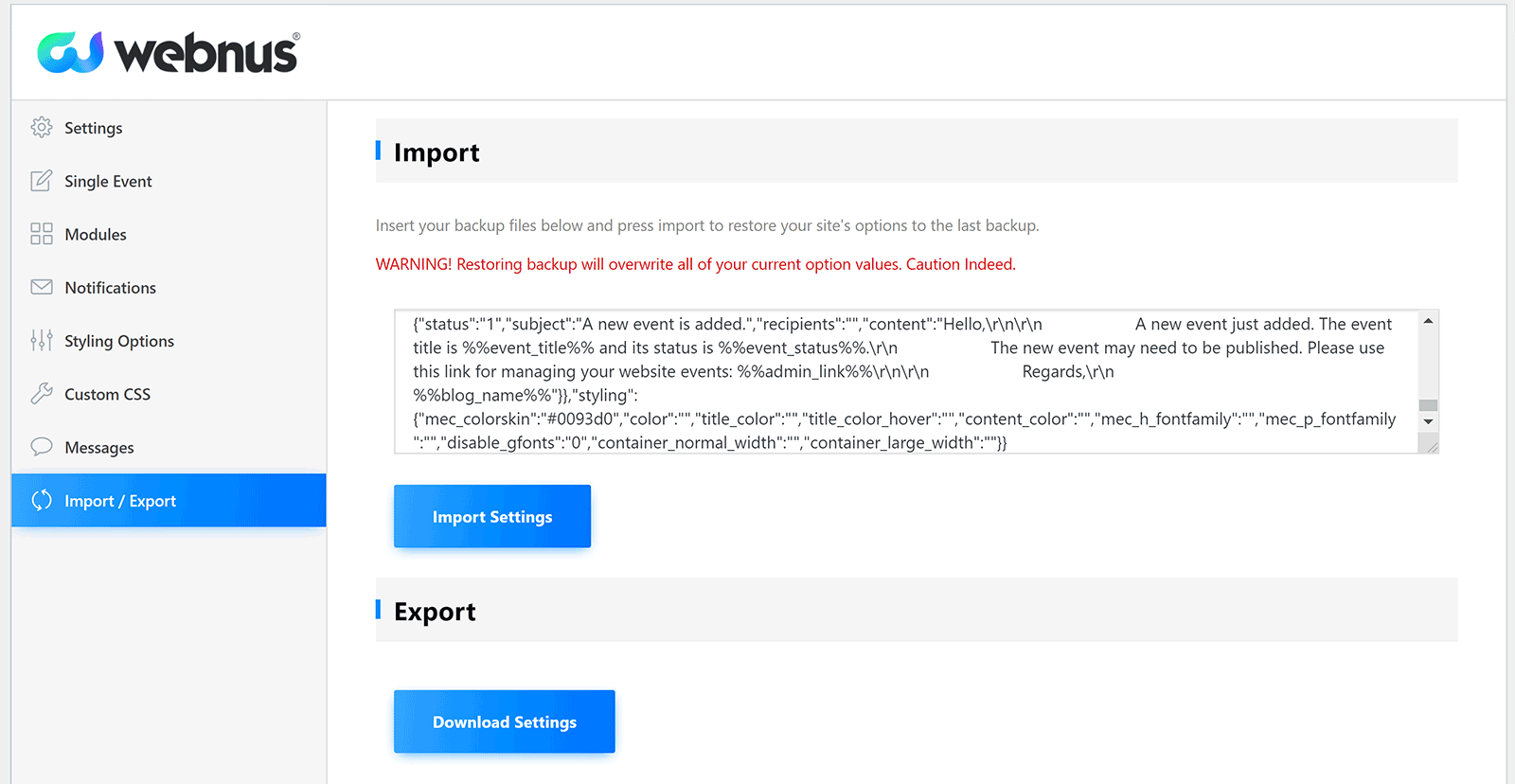
All in all, I was pleased with the options available in the main plugin settings page of Modern Events Calendar. I do feel, however, that many options could be grouped together so that it is easier to make customisations.
Importing Events From Other WordPress Event Calendar Plugins
The WordPress plugin system has been key to its success. It allows website owners to transform their websites with new features and functionality.
One thing that users sometime forget is that WordPress plugins that add a lot of functionality to your website can sometimes be restrictive long-term as it can be difficult to migrate to an alternative solution. I have found myself in this position in the past and kept using a solution because changing to another WordPress plugin would have involved having to manually re-create the data using the new solution.
Thankfully, Modern Events Calendar helps you avoid this predicament by letting you import and export events in a number of ways.
In the Import/Export area of the plugin you can import data from services including Google Calendar, Facebook Calendar, and Meetup. Events can also be exported back to Google Calendar. These tasks can be synchronised automatically via cron jobs.
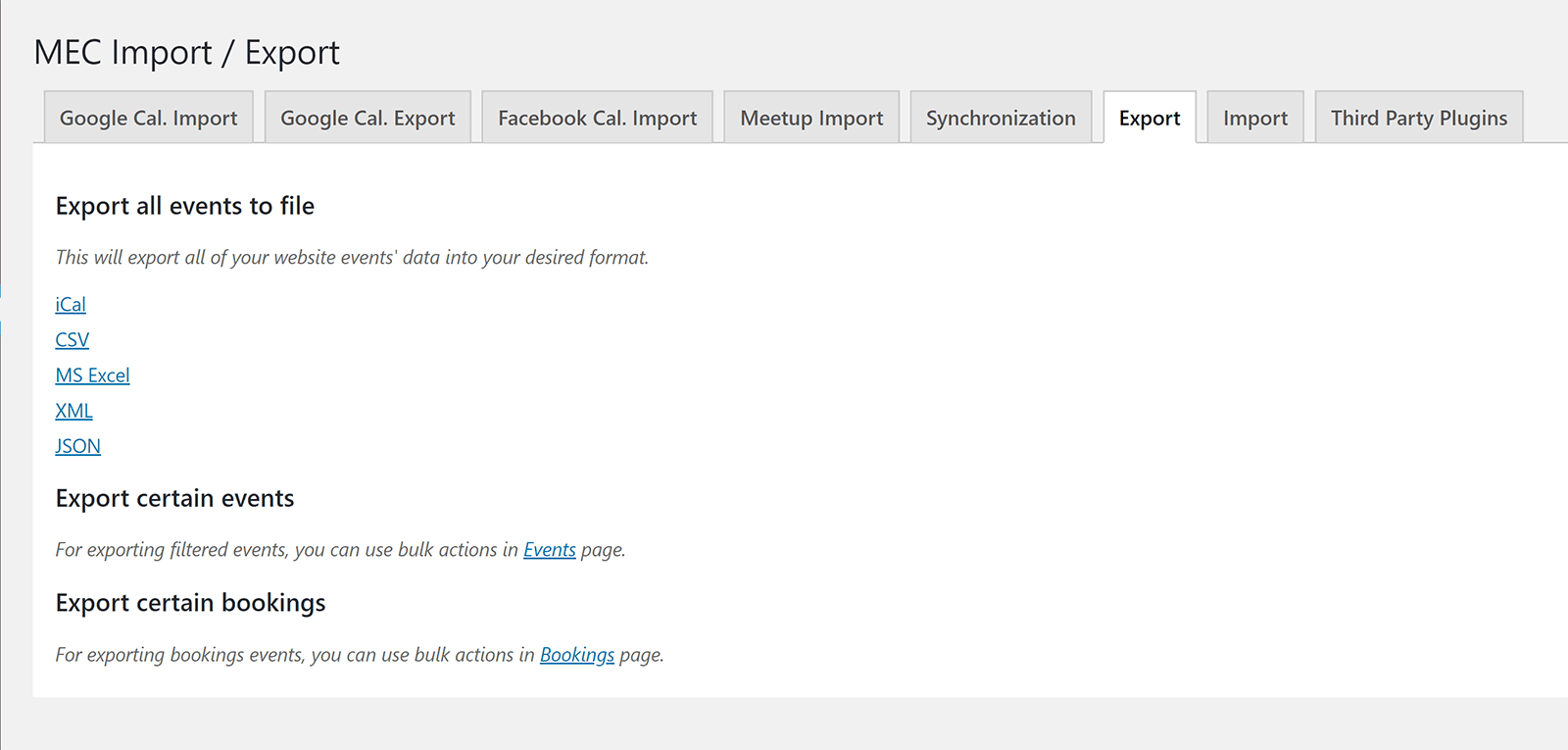
Events can be imported into your website in XML and ICS file formats. You can export your events in iCal, CSV, MS Excel, XML, and JSON, formats.
Events can also be imported directly from four alternative WordPress event calendar plugins: EventOn, The Events Calendar, Events Schedule WP Plugin, and Calendarize It. To do this, the other event calendar plugin has to be installed and activated on your website.
I was really impressed by this aspect of Modern Events Calendar. This additional functionality means that it is not only easier to switch to the plugin, it is also easier to switch to something else if your needs change later on.
Getting help Where You Need It
Webnus provide Modern Events Calendar customers support in a number of ways.
Those who upgrade to Modern Events Calendar Pro will gain access to ticket support. This is particularly useful if you trying to do something with the plugin that is not explained elsewhere.
Before you open a ticket, you should check out the extensive documentation area that Webnus has produced for Modern Events Calendar. You do not have to be a pro user to reference this knowledgebase.
The documentation area will show you how to install Modern Events Calendar, how to set up events, how to adjust settings, and how to set up shortcodes.
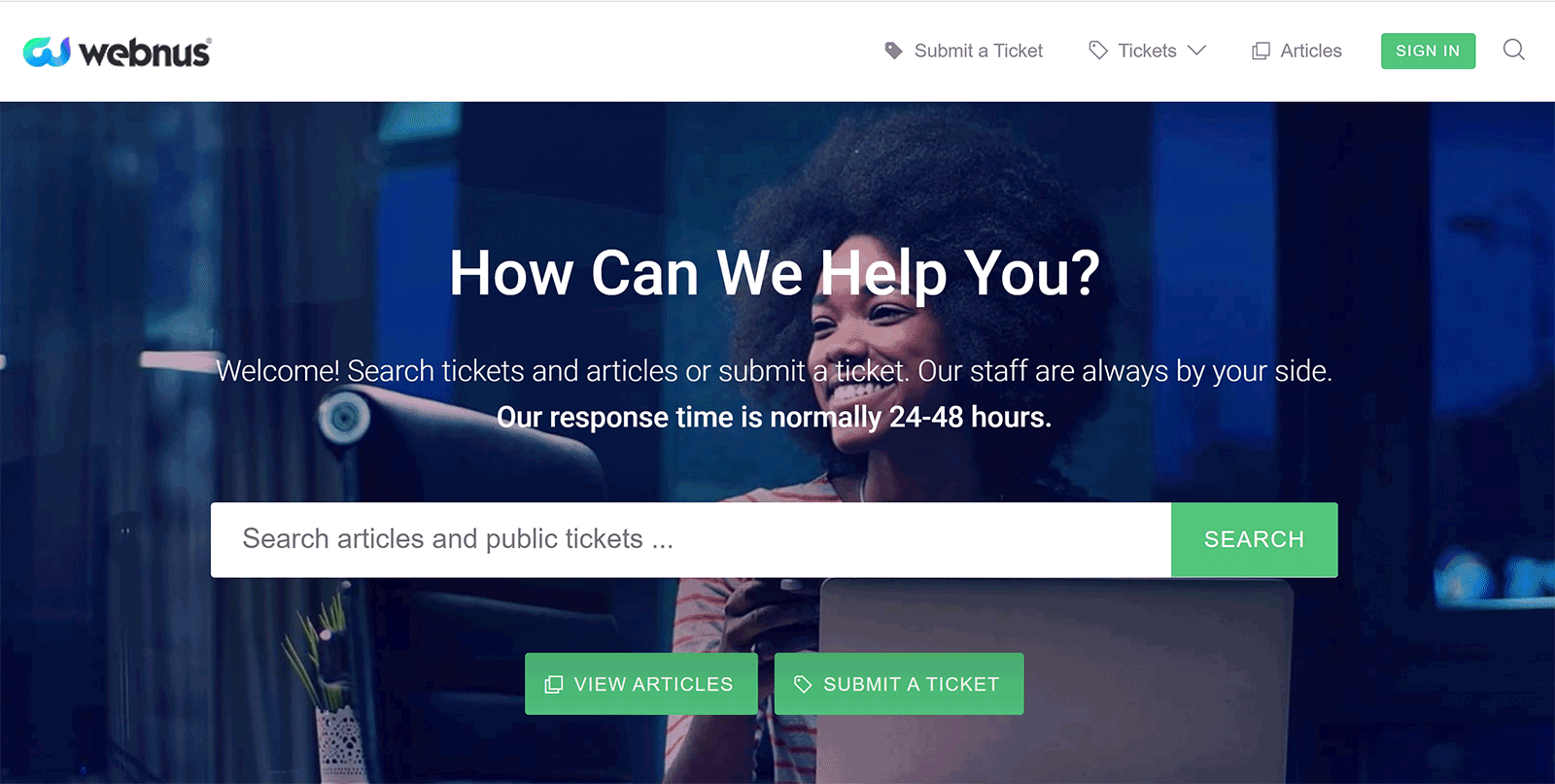
A support area is displayed in the lite and pro versions of Modern Events Calendar.
From this page you can search for answers via a search form, refer to frequently asked questions, and watch video tutorials that explain how to set everything up.
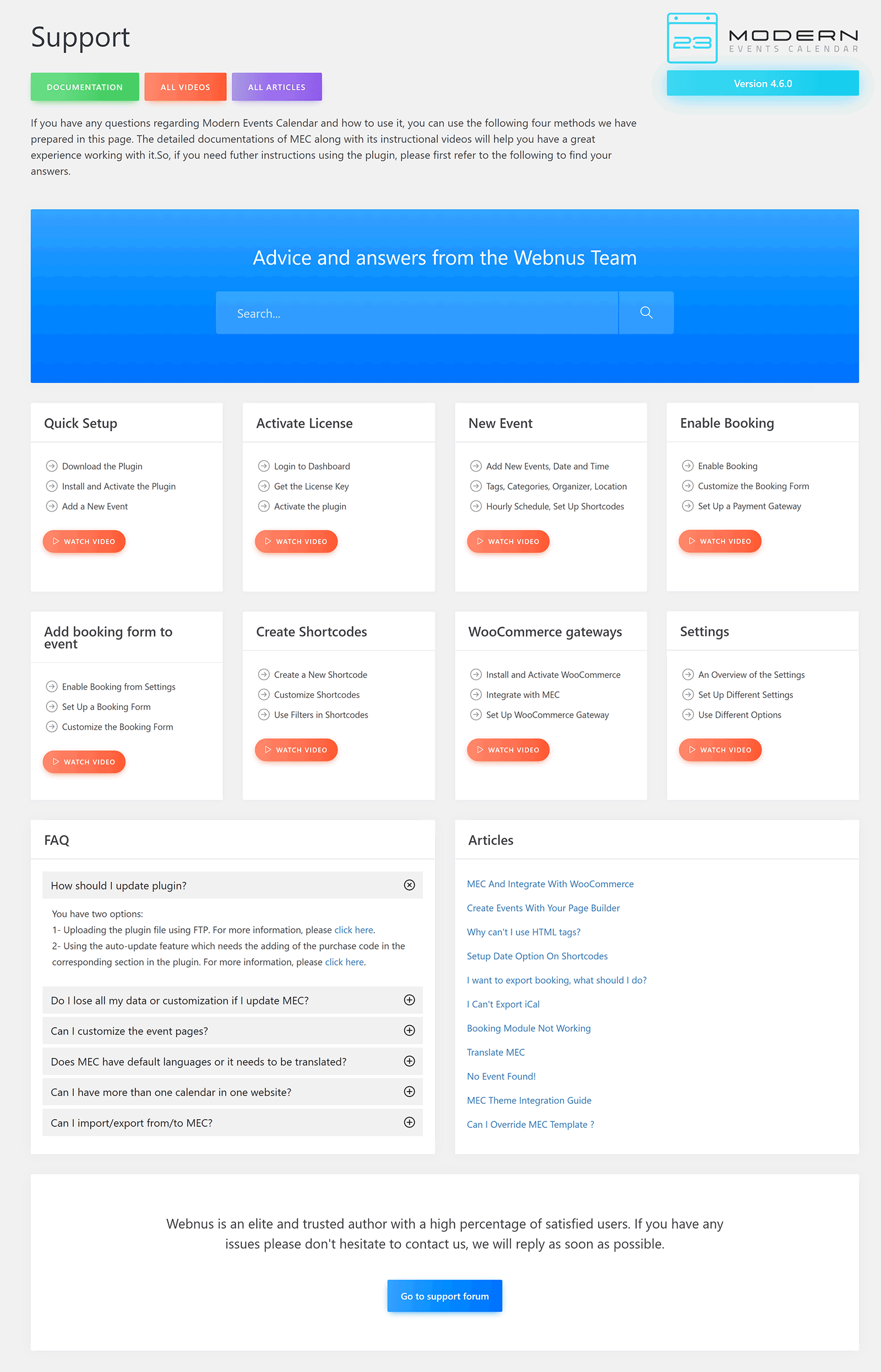
Those of you who are using the free version of Modern Events Calendar can also ask questions about the WordPress plugin on WordPress.org.
You will not receive a response to your query as quickly as those that upgraded, however the developers do actively monitor the forum and answer questions.
Modern Events Calendar Pro
I feel it is important to remind you all at this point that everything I have showed you so far is from Modern Events Calendar Lite.
There’s a ton of features and functionality in the plugin; many of which are not included in some premium alternatives.
Webnus do, of course, offer a premium version of the plugin.
It is common for WordPress developers to restrict essential features to the premium version of their WordPress plugin. Many developers get the balance between free and premium features all wrong, and as a result of this, their plugin becomes a poor advertisement for the premium version as they have removed so much functionality, users cannot actually see the benefit of using it.
Webnus have not did this. In fact, there is a good argument for saying that they give too much away free of charge. Modern Events Calendar Pro is promoted on the welcome page, however there are few references to it elsewhere. They aren’t displaying a ton of features and saying that you need to upgrade to get them.
You will, however, probably encounter a message about the pro version being required when editing shortcodes; as Modern Events Calendar Pro adds many additional skins.
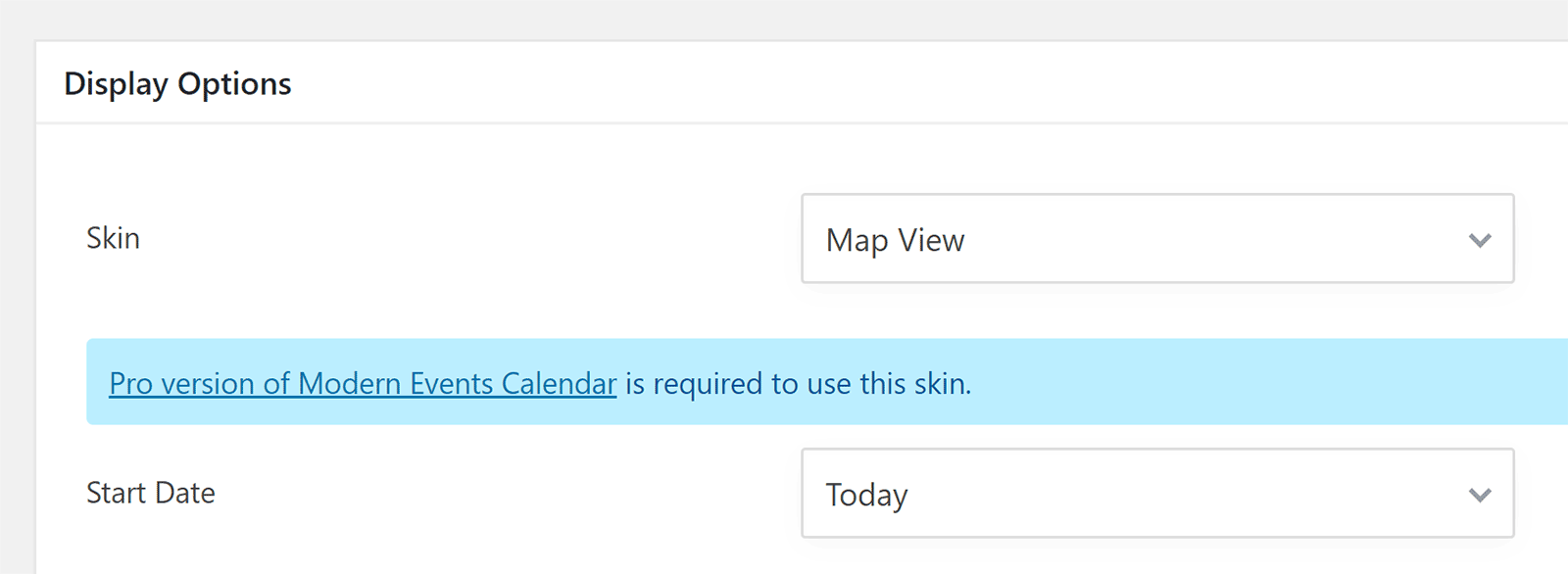
It seems weird to bring this up, but Webnus do need to do more to promote Modern Events Calendar Pro.
I detest the latest trend of developers bombarding users with notices and banners about the premium version of their plugin. It is overkill.
Yet Webnus have went out of their way not to bother users. For example, when you are in the settings area of Modern Events Calendar Lite, every notification settings page except from “New Event” is completely blank because these are settings for a pro feature.
There is a risk that some users might wonder if the WordPress plugin is broken, so why not use this page to say that these features are restricted to Modern Events Calendar Pro users?
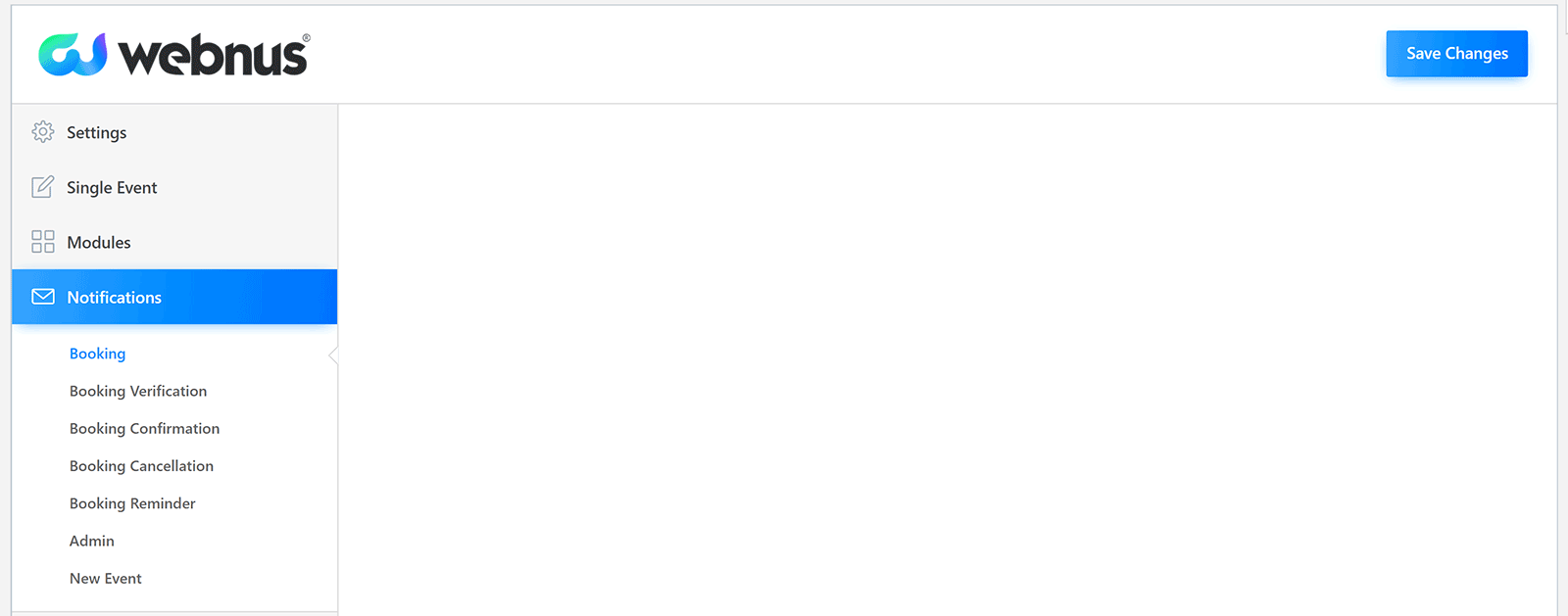
Retailing from $55, Modern Events Calendar Pro adds more than just skins to the equation. Upgrading unlocks an advanced booking and ticking system that can handle payments, a weather module, and access to premium addons. Of course, premium support is provided too.
The official website for Modern Events Calendar displays a comparison table that shows which features are available in the lite version, which features are in the pro version, and which features are also available in alternative solutions such as The Events Calendar, Events Calendar Pro, and EventOn.
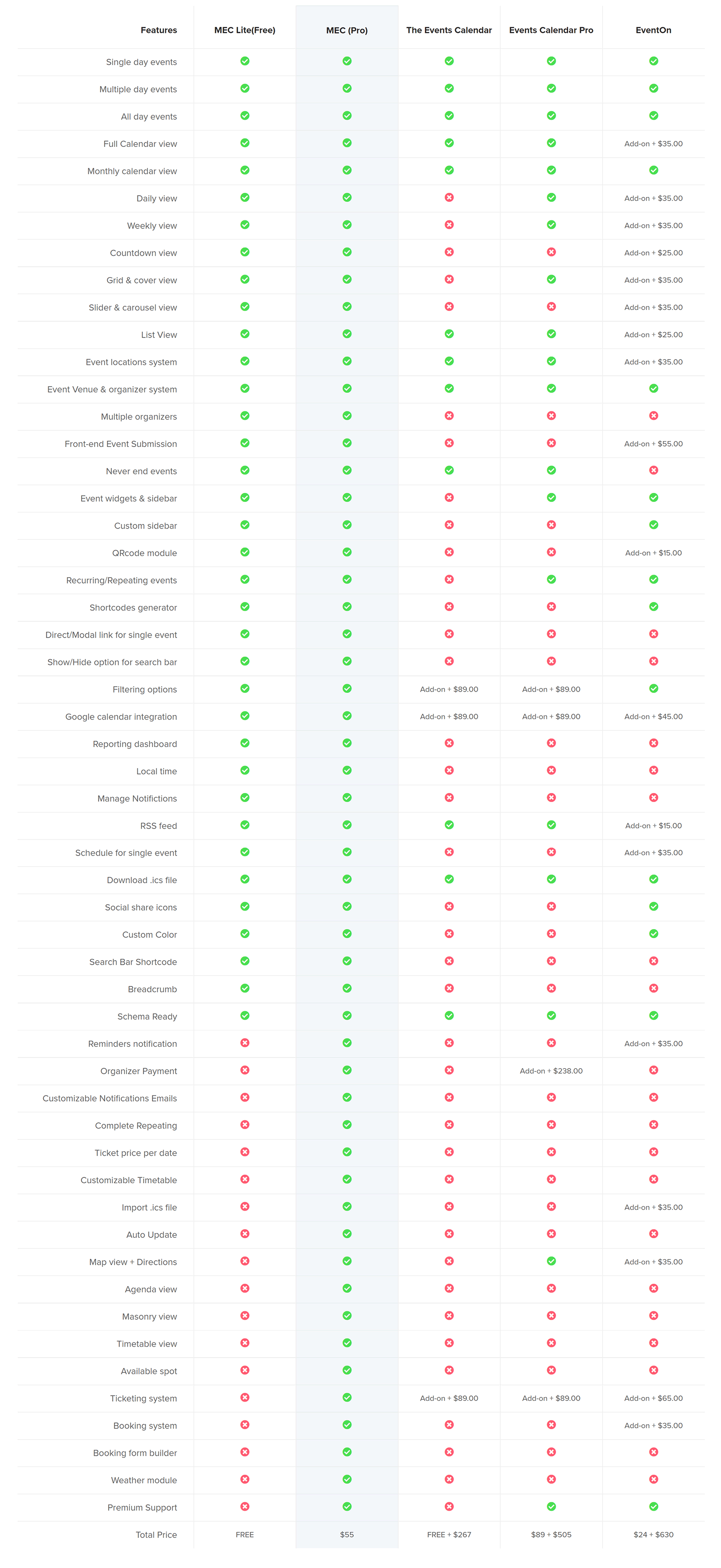
Modern Events Calendar Pro is not available as an addon to the lite version. It is a standalone plugin.
In order to use it, you need to first deactivate the lite version and then activate the full version. Don’t worry, all your events and settings are retained.
When the plugin is activated, a new booking section will be visible in your settings area. By default, the booking module is deactivated, so you will need to enable it to use booking functionality.
Once enabled, you will see additional options for coupons, taxes and fees, and ticket variations. You need to enable each of these features to use them.
Options for a booking form and payment gateways are also added together with a new bookings link in your WordPress admin menu.
The main booking page lets you set up automatic verification of emails and bookings and set the date format.
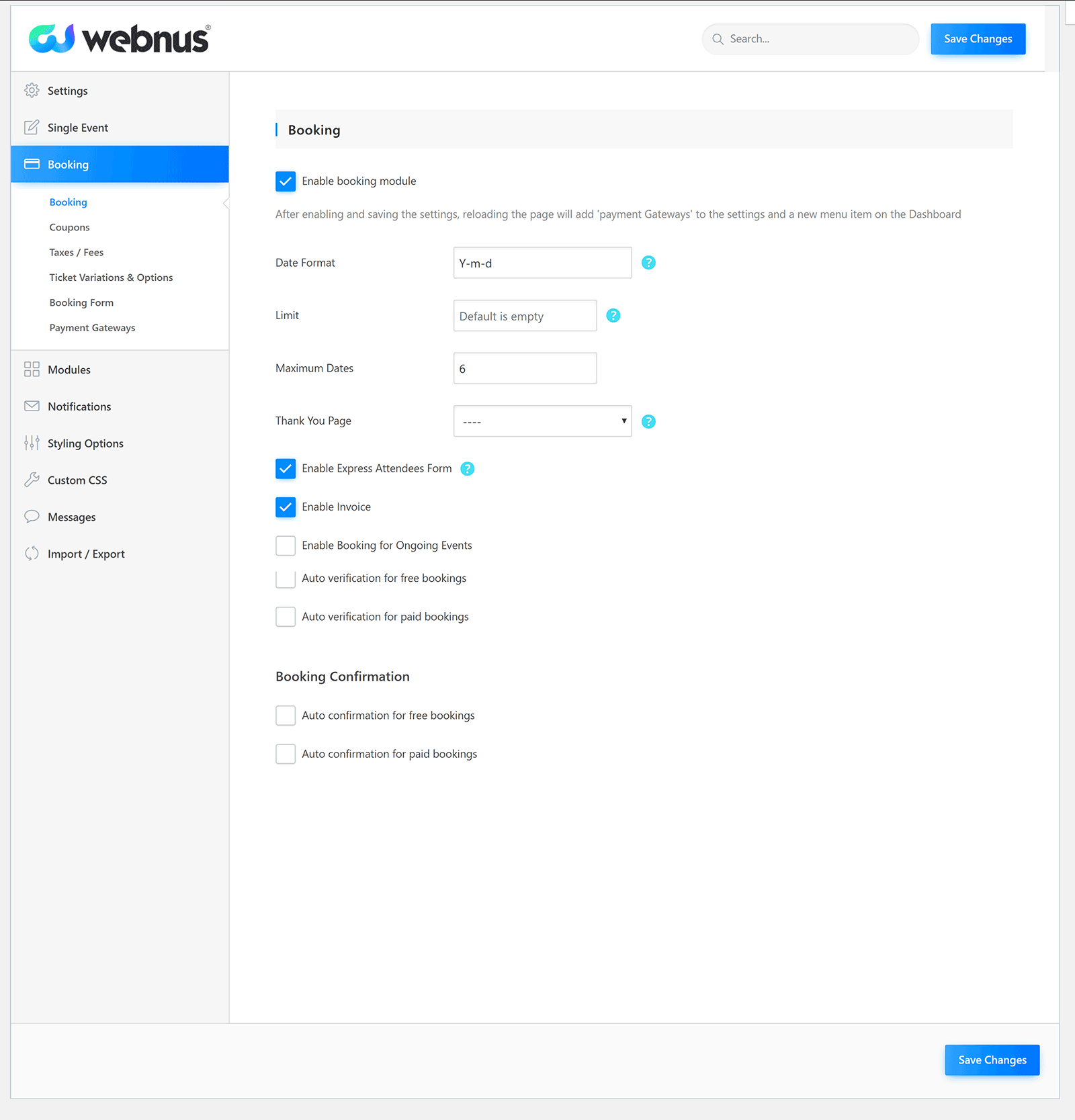
Thirteen fields are available for your booking form. You can drag and drop each one into the position you want and change the labels and some other settings.
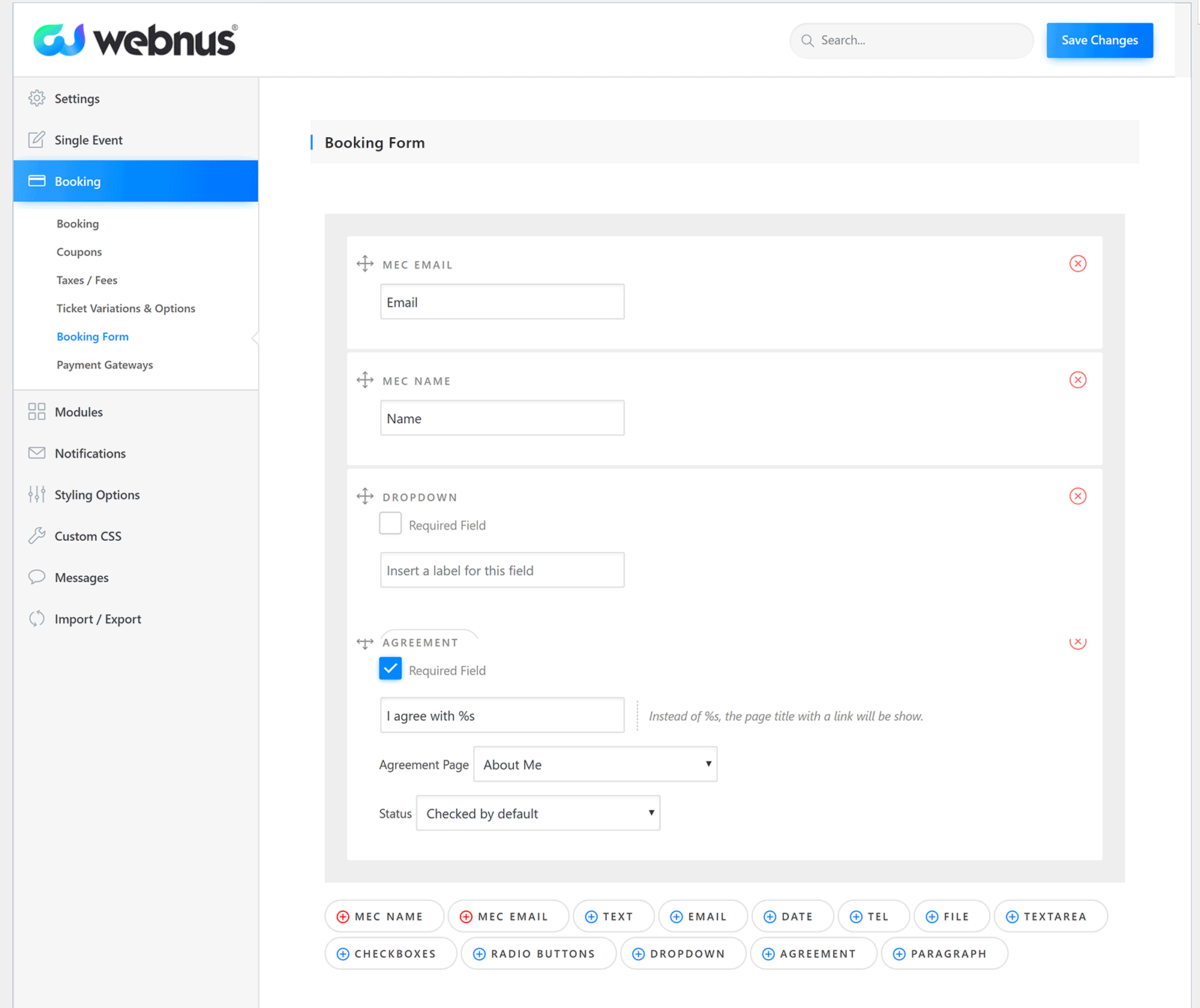
Users can pay locally, via PayPal, via Stripe, or using WooCommerce (this is a premium addon). There is also an option for organisers to handle payments themselves.
Be sure to test your payment configuration after adding a particular method.
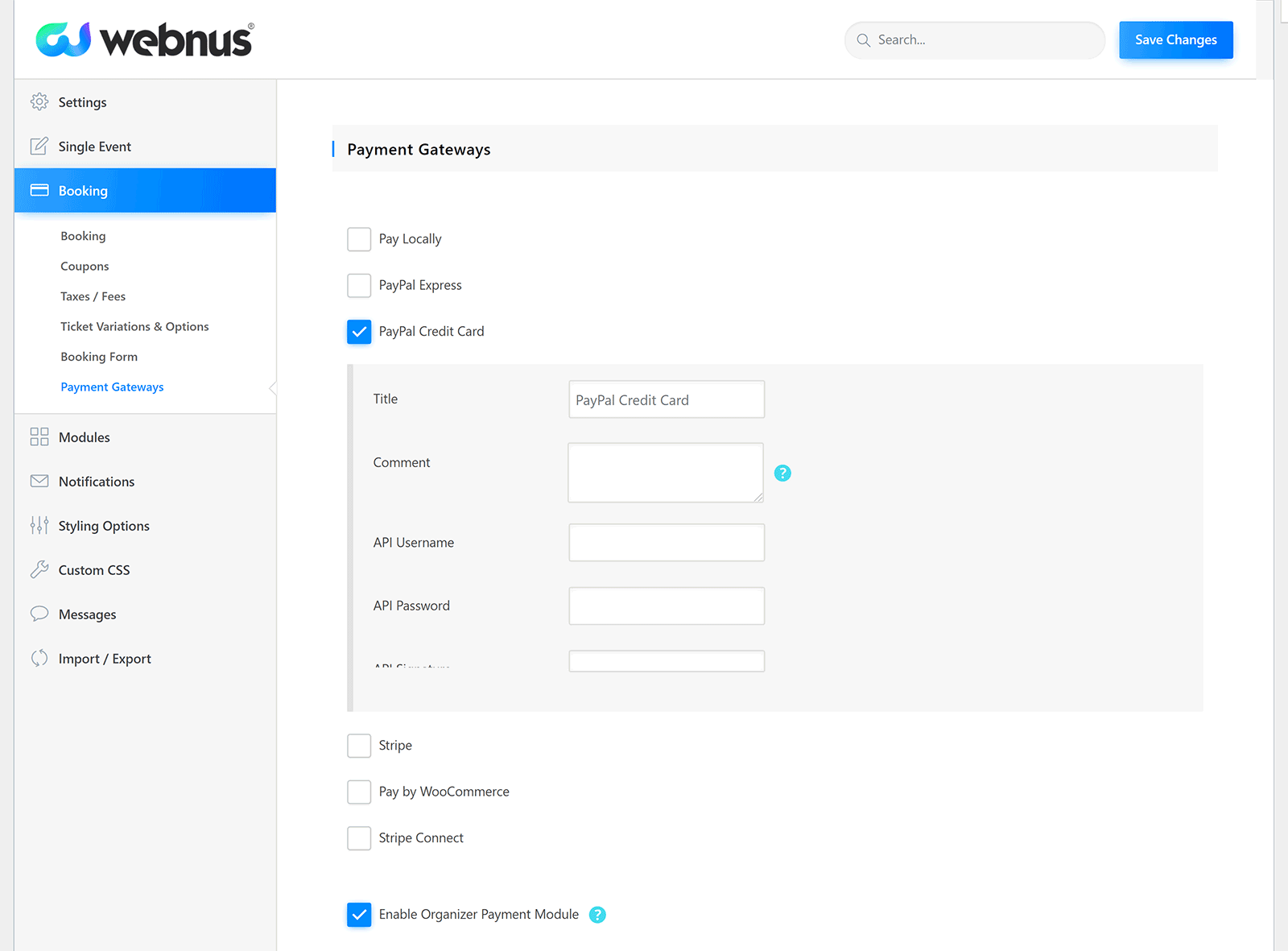
In addition to event details, booking information can now be entered in the event management page. There are options for fees, booking limits, ticket variations, and more.
Settings can be inherited from the settings you defined in the main settings area. Alternatively, you can customise each event uniquely.
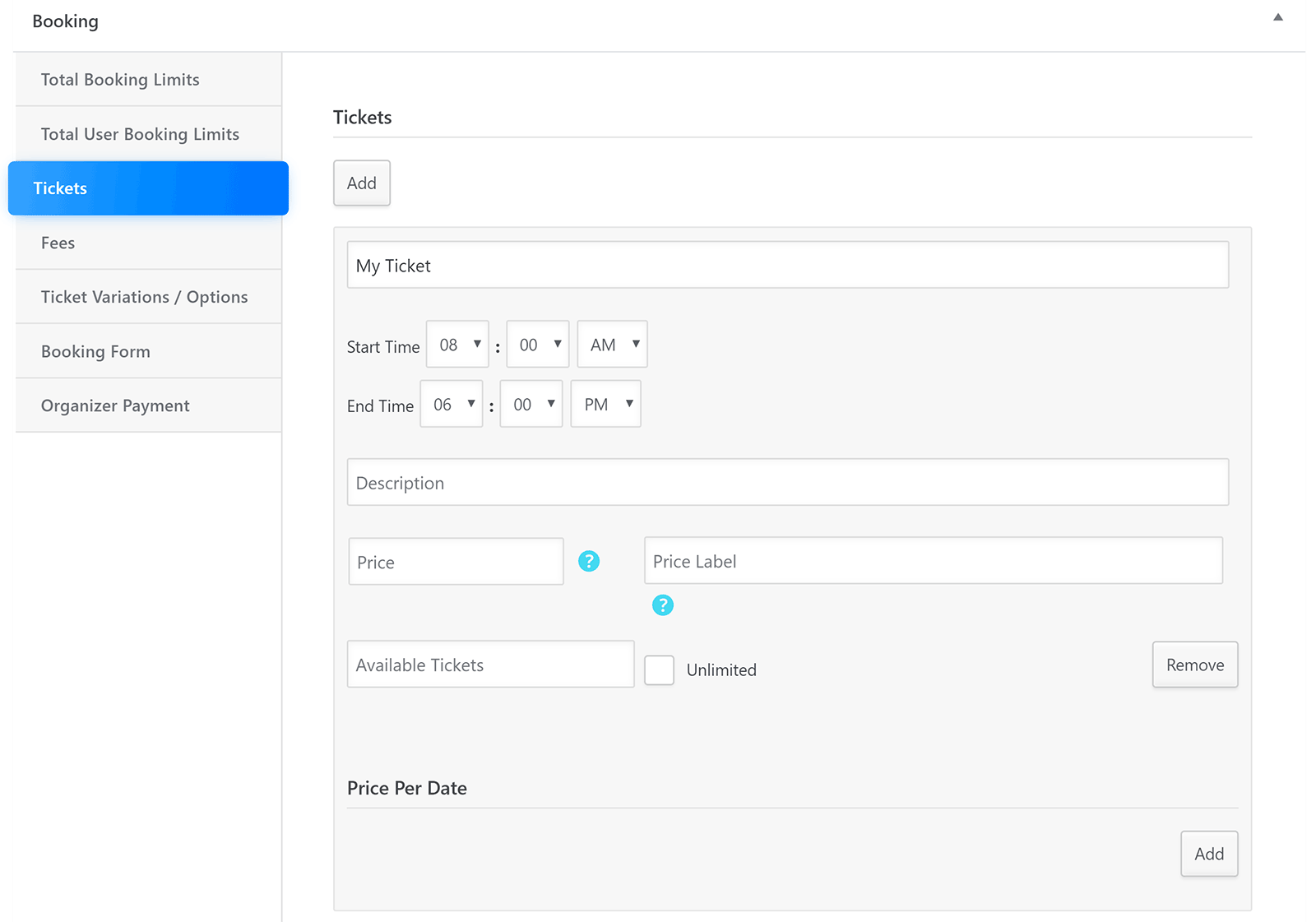
Bookings can be added manually. You may wish to use this when you have taken payments offline for tickets.
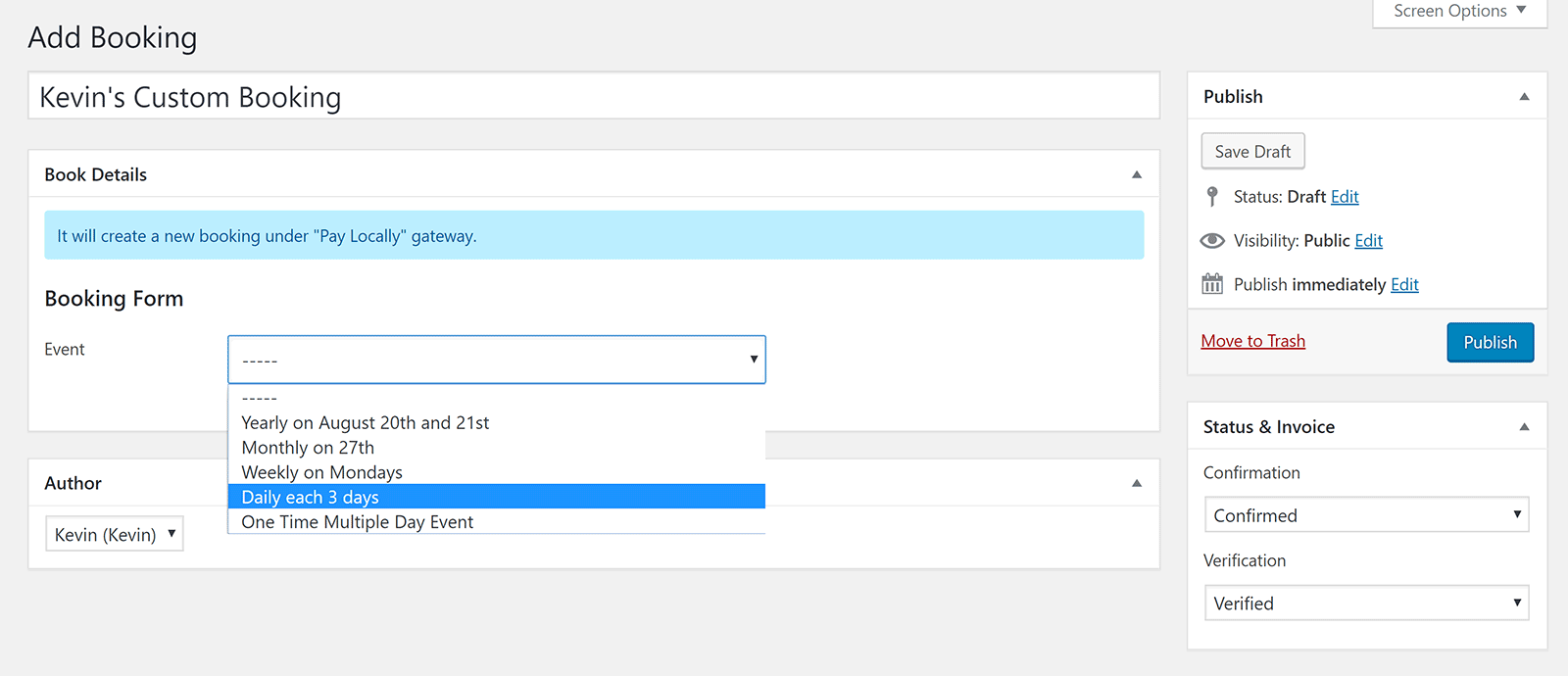
Modern Events Calendar Pro adds other functionality such as Google Maps, QR code, weather, and BuddyPress integration. All of these features have to be enabled for their respective options to be shown.
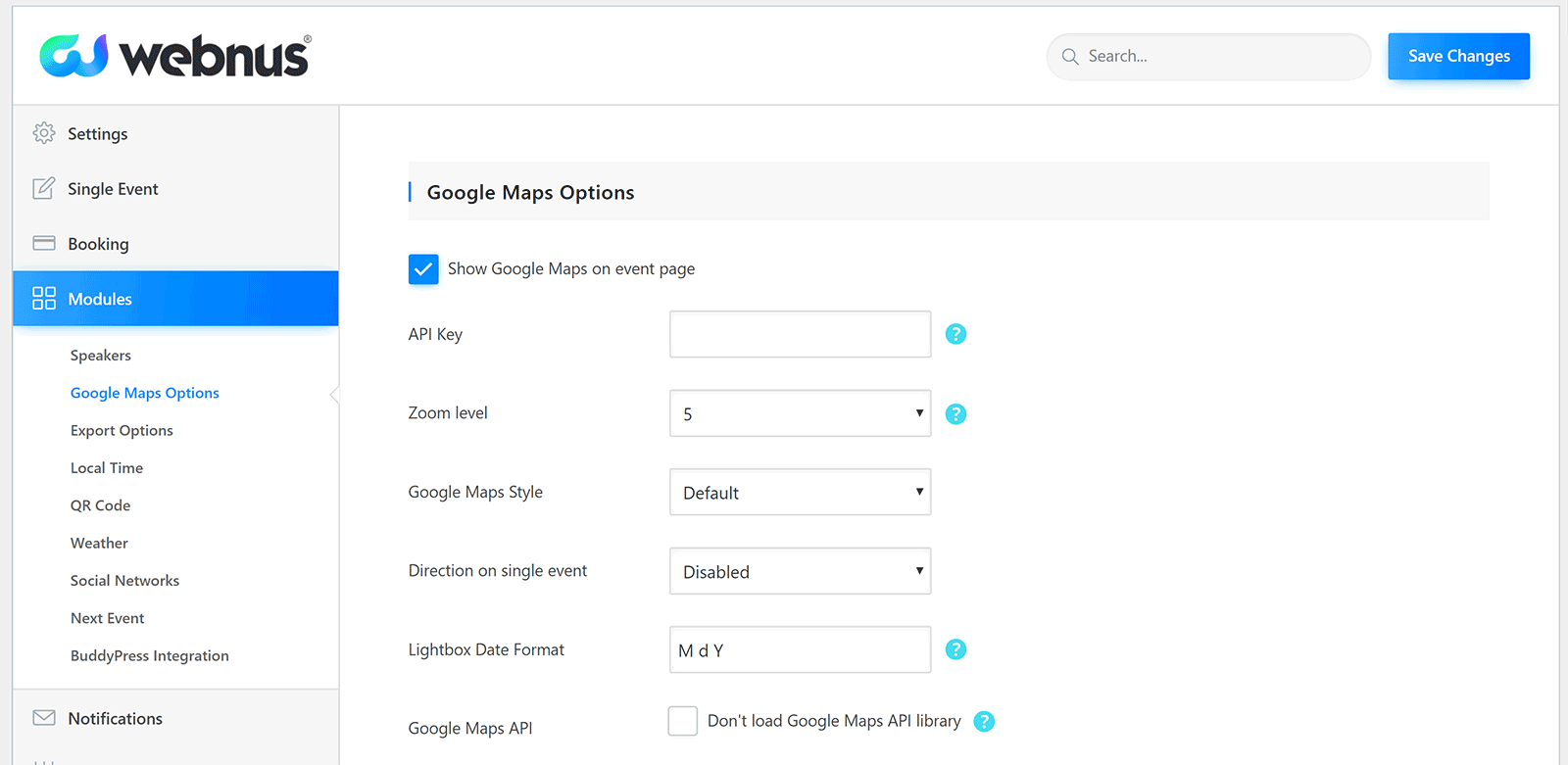
The notification pages that are missing from the lite version of Modern Events Calendar are available in the pro version.
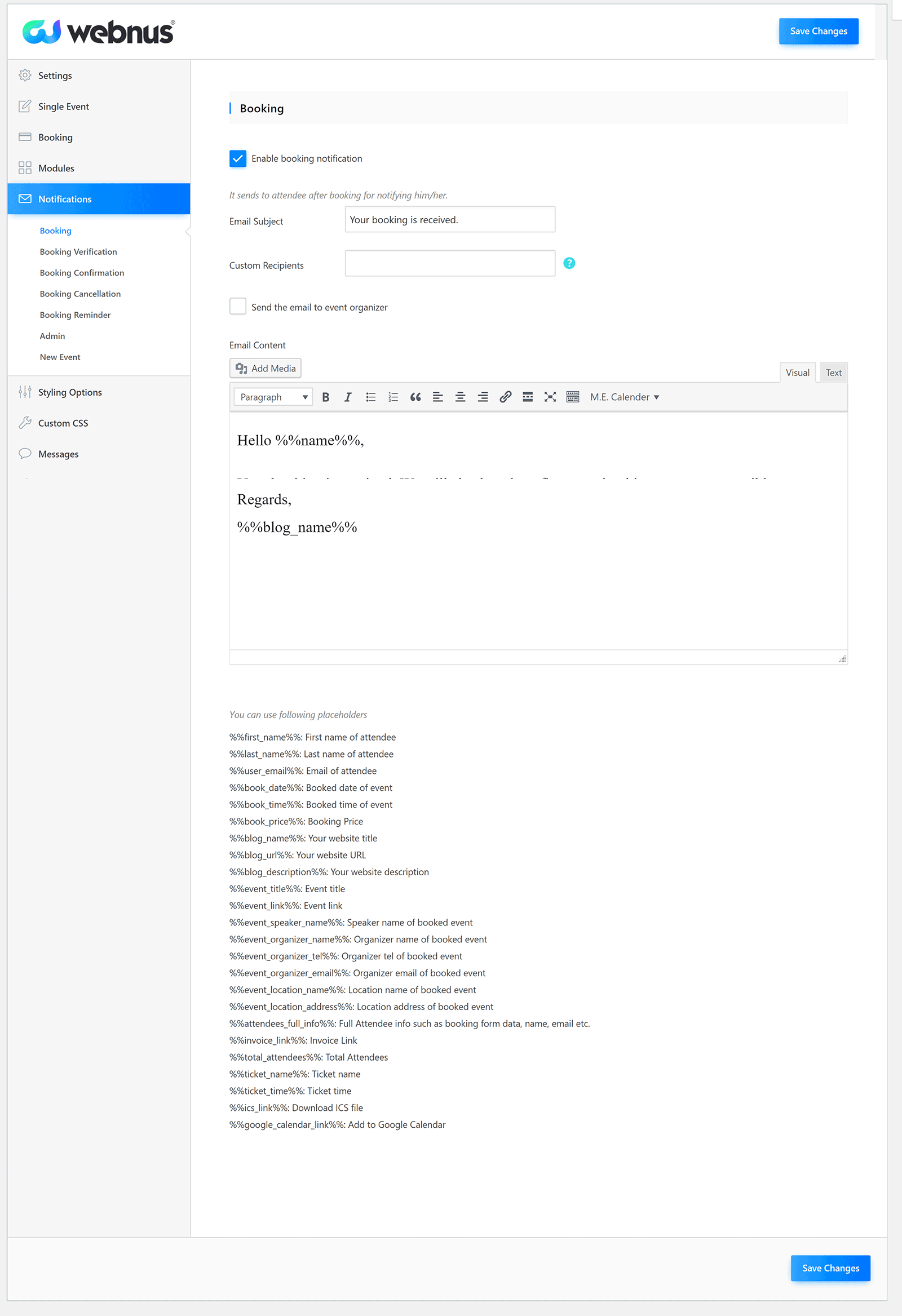
If you just want to display events and organise them on your website, I believe Modern Events Calendar Lite is sufficient.
When you need to upgrade your events setup, Modern Events Calendar Pro is a good choice. By upgrading you will be able to manage bookings directly on your website and use coupons to help promote events using discounts.
The plugin natively supports PayPal and Stripe, but the ability to accept payments via WooCommerce unlocks many possiblities. This is a premium addon, but it is something to consider.
Modern Events Calendar Pro also gives you many additional shortcode views and skins to help display events to users.
Modern Events Calendar Addons
Five premium addons are available for Modern Events Calendar: Woocommerce Integration, Elementor Shortcode Builder, Elementor Form Builder, Elementor Single Builder, and Event API.
At the time of writing, three addons are in development for release in the future: Multisite Event Sync, Invoice Manager, and User Dashboard.
The addons page which is displayed in the main admin menu of Modern Events Calendar reminds you that “All addons are provided for the Pro version and you cannot install and use them on the Lite version”. This message is displayed in both Modern Events Calendar Lite and Modern Events Calendar Pro.
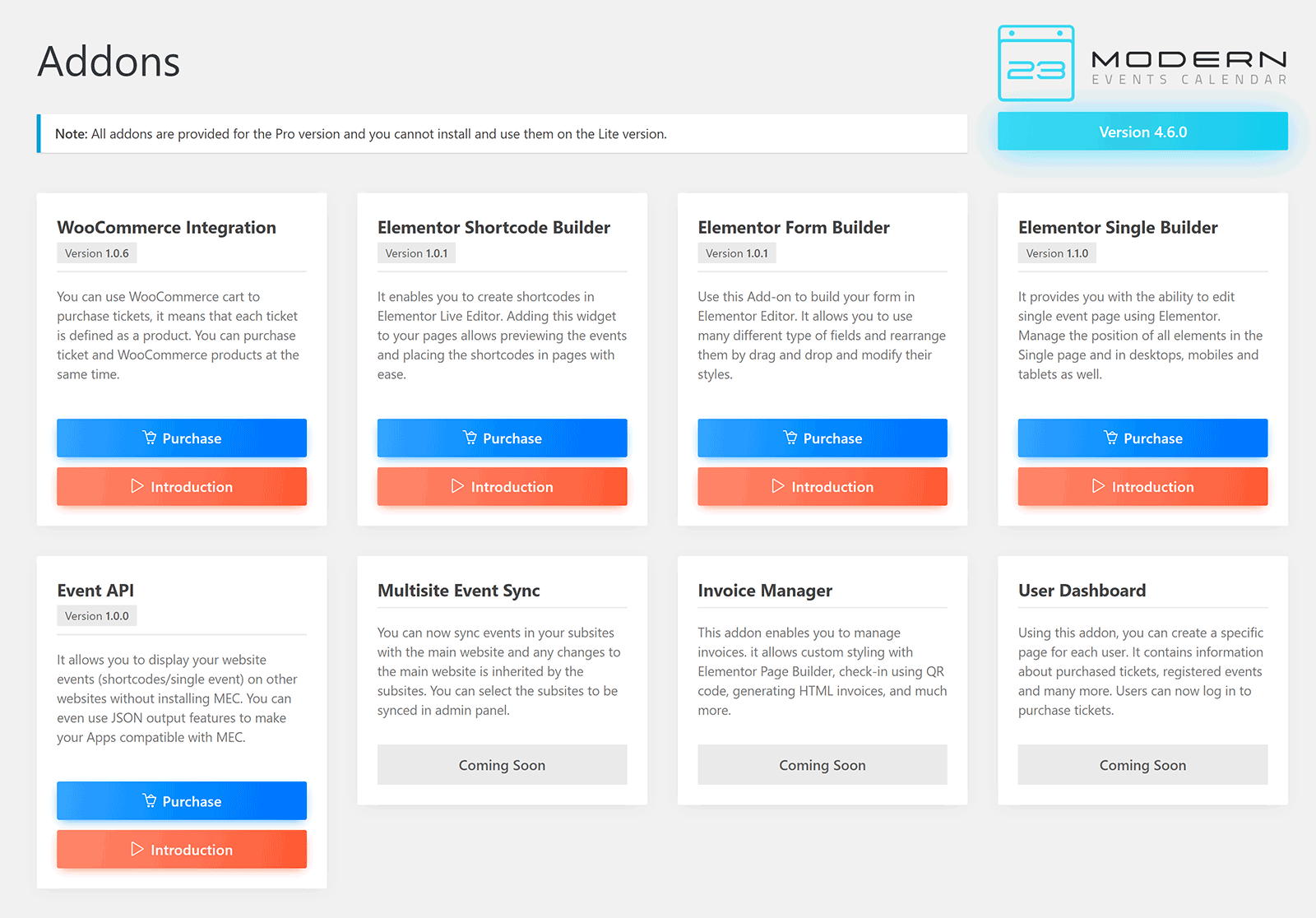
The addons available at the moment retail at $35 each, except Event API, which retails at $45. Bundles are available, which can save you money if you need a few addons.

The Woocommerce Integration addon lets you use WooCommerce to take payments.
This is useful if you want to integrate Modern Events Calendar into your existing shop or if you want to sell merchandise for events such as t-shirts.
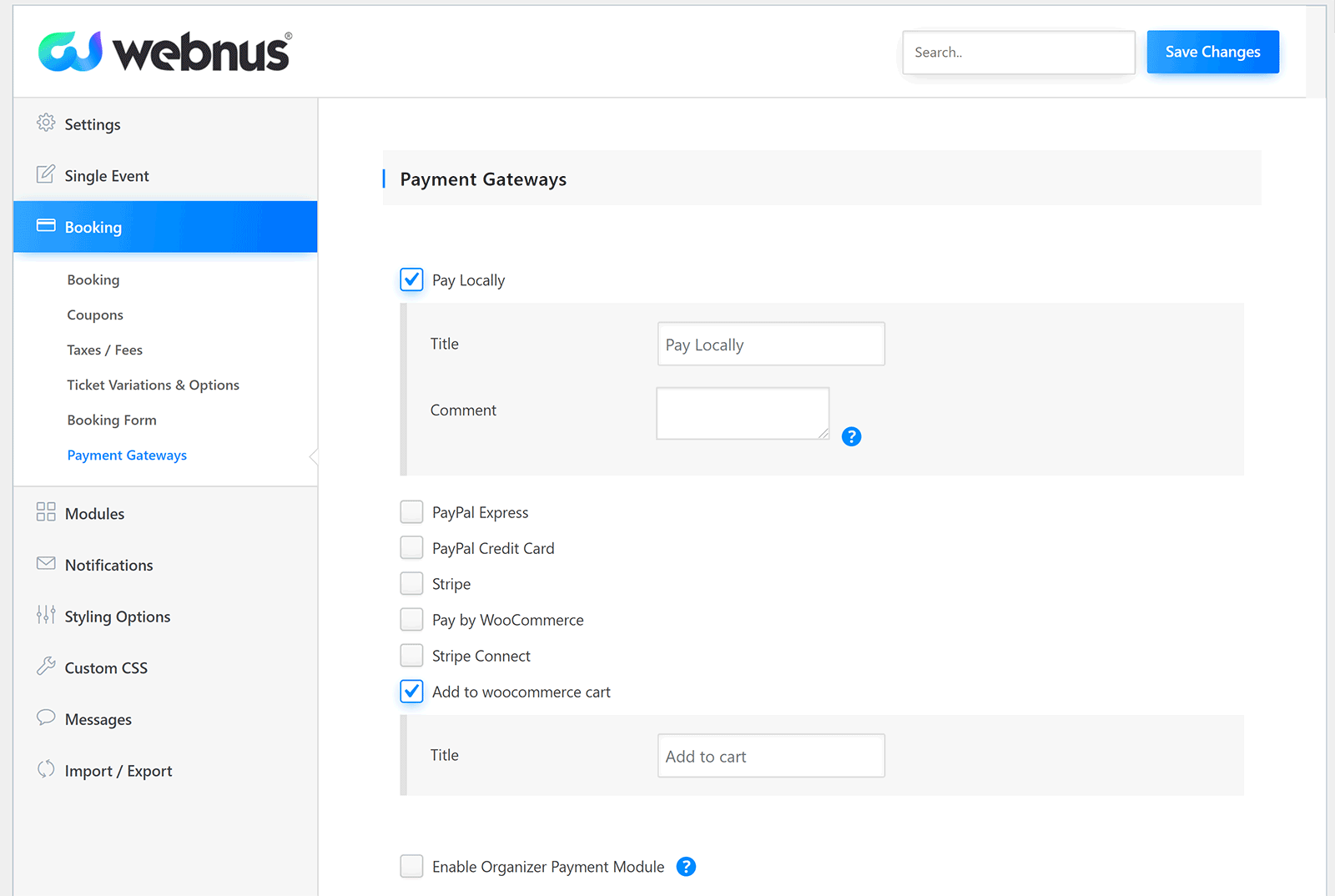
The Event API addon allows you to display events from your calendar on other websites without them having to install Modern Events Calendar.
Access to the Javascript code can be restricted to certain websites or allowed for all websites.

The remaining three addons can be used to design things using Elementor. This drag and drop builder is, of course, free to download.
Elementor Shortcode Builder can be used to create and edit shortcodes in Elementor.
On the left-hand side of the page you can change the calendar view, the style, start date, and more. The search bar is customisable too and there are filtering options.
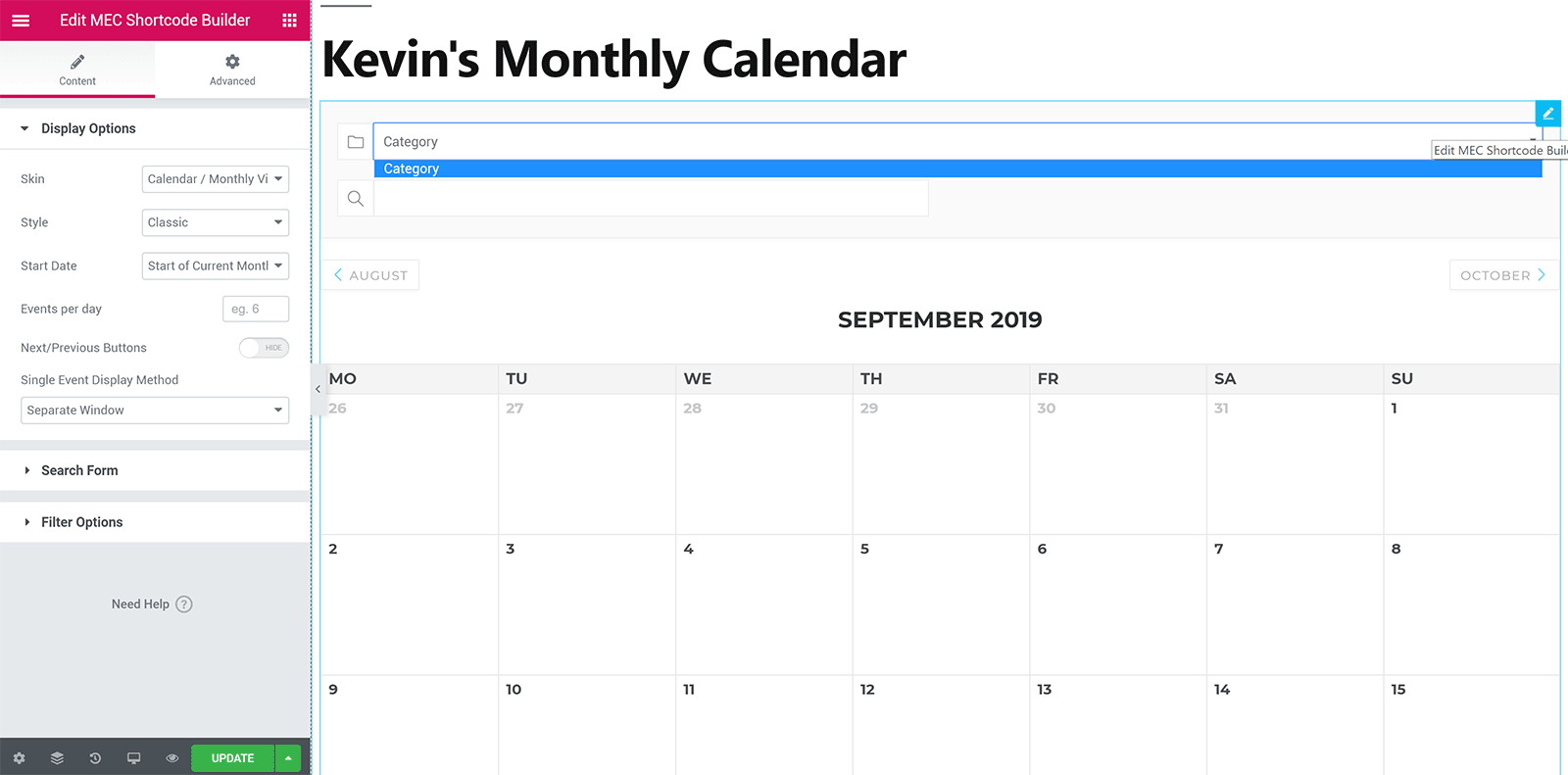
When you activate Elementor Form Builder on your website, a new page will be added to your Modern Events Calendar admin menu that lets you build forms using Elementor.
This addon really simplifies the process of creating forms. You can add new items, change styling, add margins and padding, add headers, and integrate other elements such as videos.
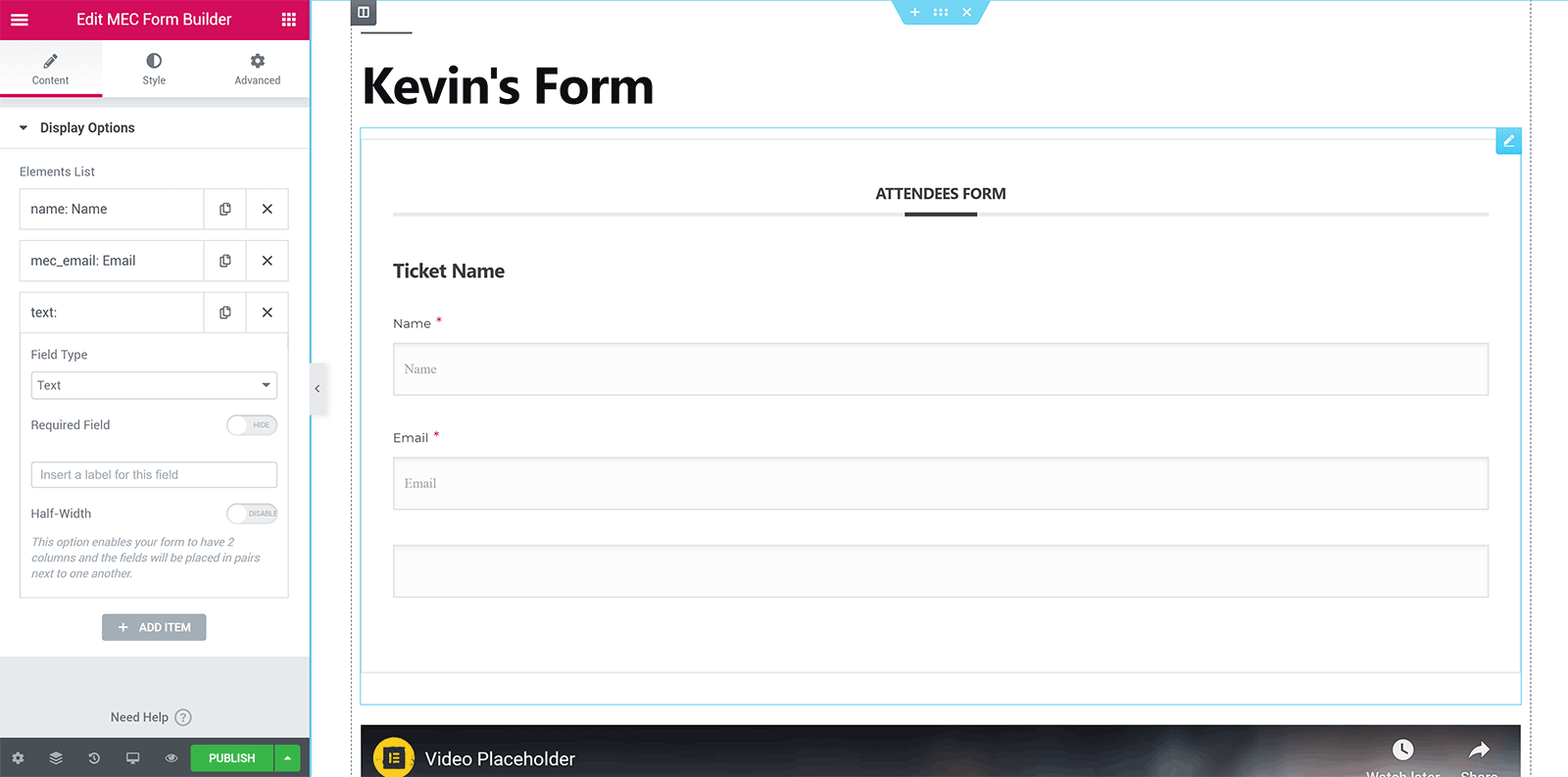
Last but not least is Elementor Single Builder. This addon adds a new page to your Modern Events Calendar for editing single event pages.
Twenty-six content modules are available including event content, event cost, and event map. Essentially, there is a content module to help you display every aspect of your event.
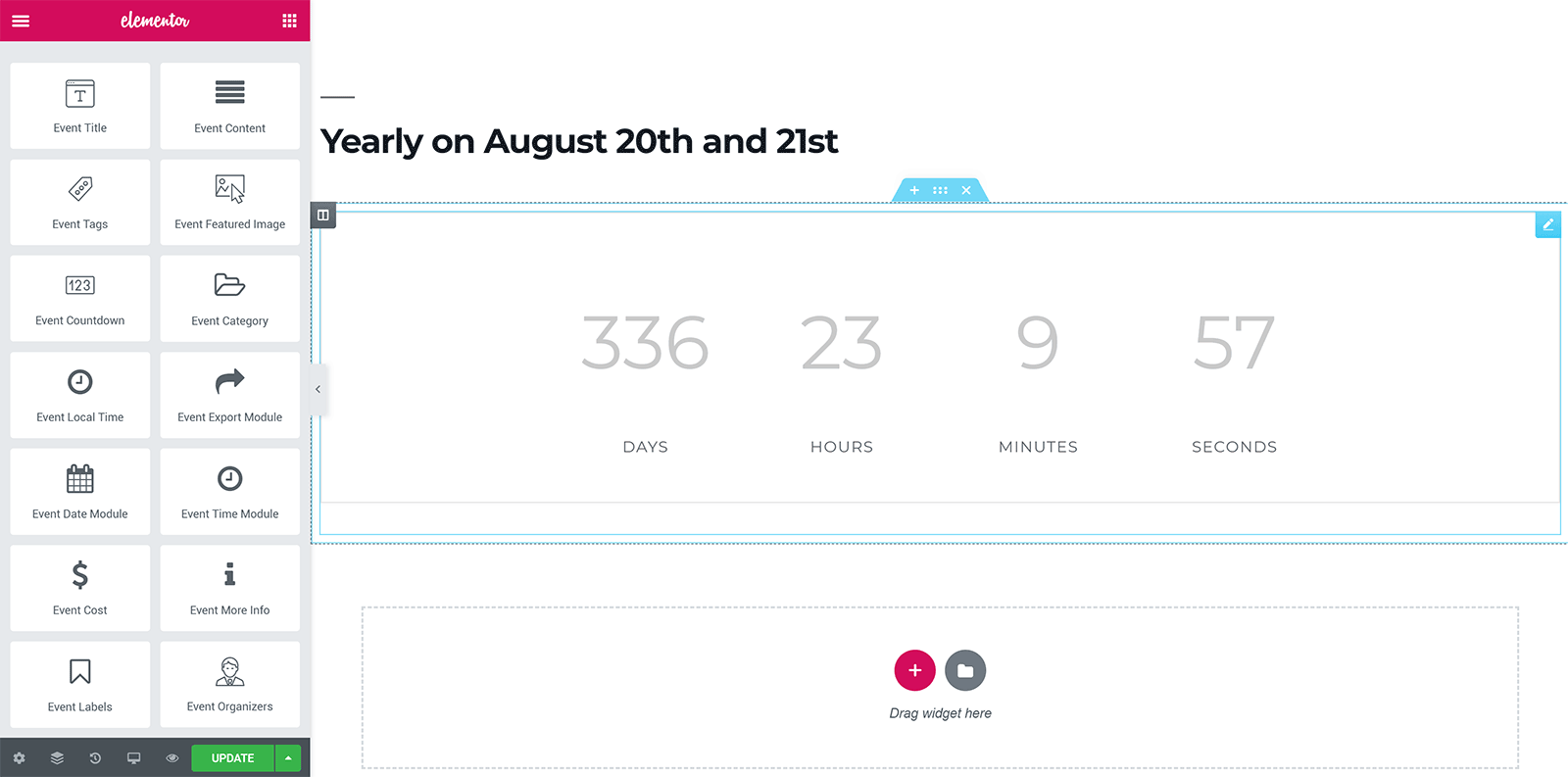
I was impressed by the Modern Events Calendar addons. WooCommerce is a massive WordPress plugin so it’s great that website owners can tap into that. Likewise, being able to create and edit shortcodes, forms, and events, using Elementor, is incredibly useful. It makes it easy to make pages look professional.
I am looking forward to see the addons that are released in the future. The User Dashboard addon that is in development is something that I would love to see as it helps customers manage their bookings. The invoice manager looks like it could be handy too.
The Cost of Using Modern Events Calendar
As you are already aware, Modern Events Calendar Lite is free to use, however if you want support you will have to purchase the pro version. Upgrading to this version also unlocks pro features such as the booking module together with additional view types, attendee lists, the coupon system, and the weather module.
Webnus have adopted a sensible pricing policy that does not restrict features. I prefer this approach as it means you are not forced to step up to pricier plans in order to get the features you desire.
All licenses come with lifetime updates and one year of support. The number of websites thare are supported depends on the license you purchase. It costs $55 for one website to be supported, $199 for five websites, and $375 for ten websites. This means the higher priced plans have an effective rate of $39.80 and $37.50 per website.
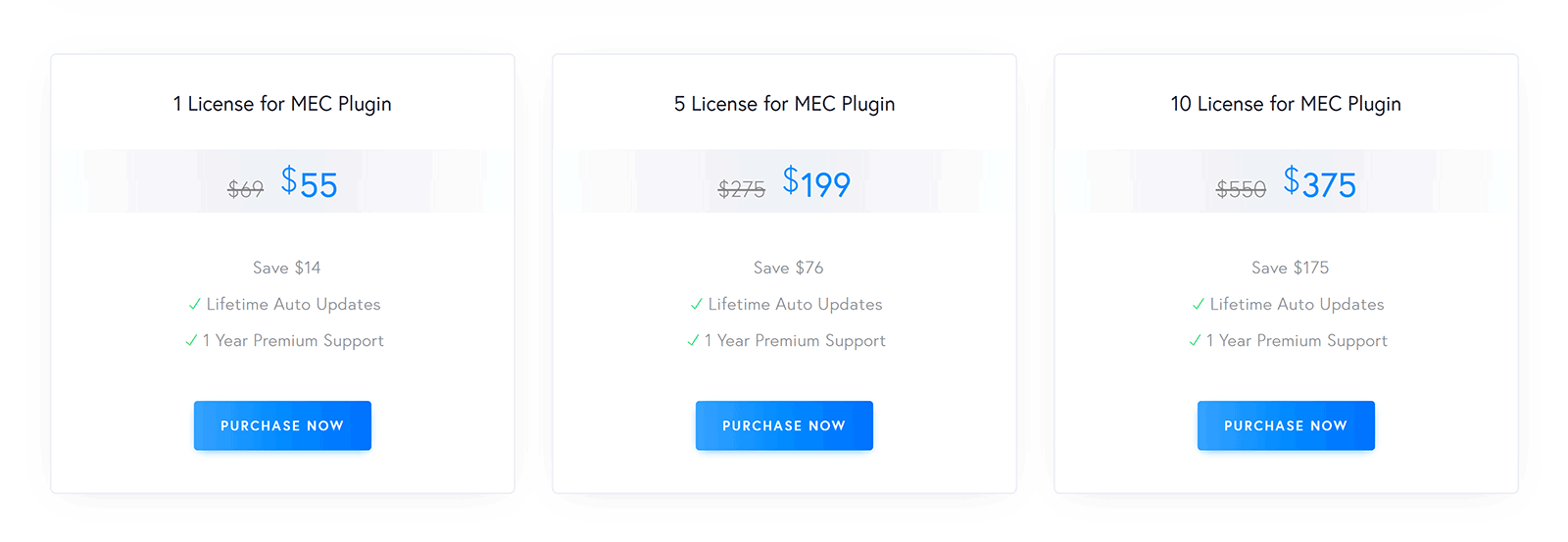
Purchasing Modern Events Calendar Pro gives you access to premium addons.
The Event API addon costs $45. The remaining addons, Woocommerce Integration, Elementor Shortcode Builder, Elementor Form Builder, and Elementor Single Builder, retail at $35 each.
Each addon purchase comes with lifetime updates and one year of support.
If you plan on purchasing multiple addons for Modern Events Calendar, you may be better buying one of their bundles.
The Elementor Addons Bundle costs $79 and includes Elementor Shortcode Builder, Elementor Form Builder, and Elementor Single Builder. You will save $26 over buying these addons separately.
The Woo Plus Elementor Bundle costs $99 and includes WooCommerce Integration, Elementor Shortcode Builder, Elementor Form Builder, and Elementor Single Builder. This plan works out $41 cheaper than buying the addons on their own.
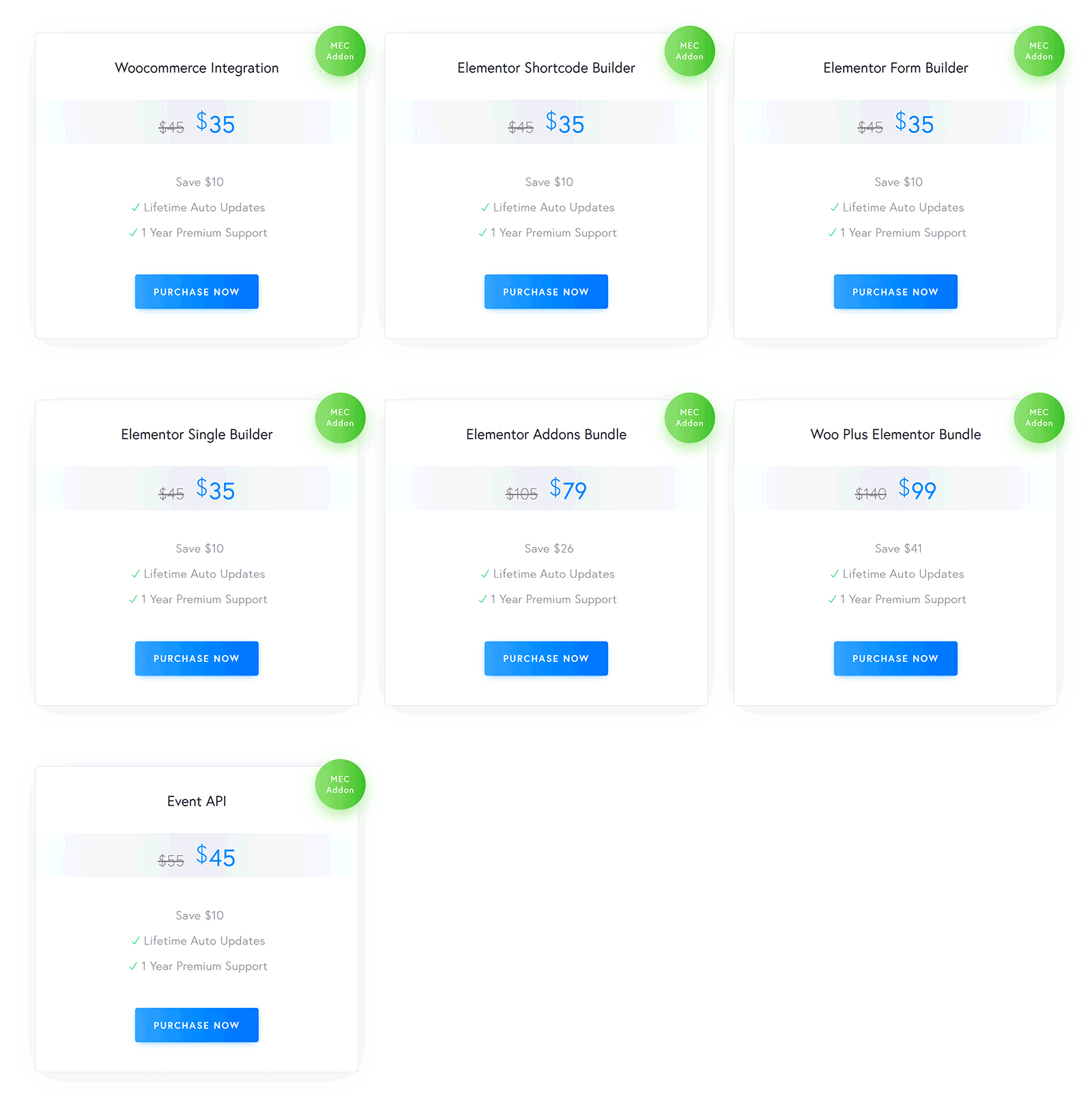
If you purchase Modern Events Calendar Pro, or any of the available addons, you are eligible for a full refund within 30 days if you are not satisfied.

Those of you who use the lite version of Modern Events calendar can continue to reference their knowledgebase free of charge. You can also ask for help on WordPress.org, however if you need priority support I recommend purchasing a pro license as it will give you ticket support.
Final Thoughts
I hope you have enjoyed this look at Modern Events Calendar.
It is one of the best ways you can manage events and handle bookings on a WordPress website. As you have seen, the plugin has hundreds of settings to help you customise your events and its support of third-party services and WordPress plugins is superb.
You can learn more about Modern Events Calendar on the official website, but my recommendation is to install Modern Events Calendar Lite on a WordPress website as it will help you see exactly what the WordPress plugin can do.
You can continue to use the lite version on your websites free of charge, but I do encourage you to check out Modern Events Calendar Pro as it adds a booking system and many other additional features that I believe enhances the whole event setup.
Thanks for reading.
Kevin

